NLP board member Liz Ramos wins California teaching award
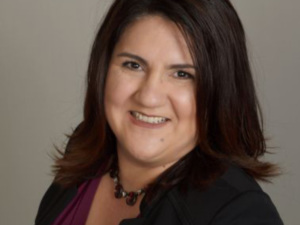 NLP is thrilled to offer heartiest congratulations to Liz Ramos, a high school teacher and a member of our board of directors, on being named Outstanding Secondary Level Social Studies Teacher of the Year by the California Council for the Social Studies (CCSS).
NLP is thrilled to offer heartiest congratulations to Liz Ramos, a high school teacher and a member of our board of directors, on being named Outstanding Secondary Level Social Studies Teacher of the Year by the California Council for the Social Studies (CCSS).
The Constitutional Rights Foundation of Los Angeles nominated Liz for the award, which recognizes educators whose classroom teachings and professional practices reflect the goals and purposes of an exemplary social studies education.
Liz told NLP that she was honored to receive the award, adding: “I strive to create a classroom and lessons that engage students, open the world up to them, and help them to become informed and engaged citizens. This is such an amazing time to be teaching with technology and resources that allow teachers to take the students beyond the classroom walls.”
She has taught history and U.S. government at Alta Loma High School in Rancho Cucamonga, California, since 2005. She actively integrates technology into her curriculum, emphasizing media and digital literacy, to help her students to seek information and to demonstrate what they have learned.
Liz began using NLP’s Checkology® virtual classroom within weeks of its release in May 2016, first with students in summer school and then with her college prep and AP government classes in the fall. The platform, she says, has helped give all of her students “the tools to evaluate credible takes on a story, examine and understand the various purposes of news and media, and to be aware of bias and deceit by providing a framework to question the news and social media postings and be critical thinkers for reference in life moving forward.”
She was a member of NLP’s strategic plan steering committee and joined the NLP board in 2017. She has attended our NewsLitCamp® professional development events in Los Angeles and Chicago and led a workshop that featured Checkology (“Empowering Students to Navigate Today’s Challenging Media Landscape”) at the National Council for the Social Studies’ annual conference in 2017.
Liz and the other award winners will be honored on March 15 at an event during the CCSS annual conference in San Jose.
What is engagement bait?
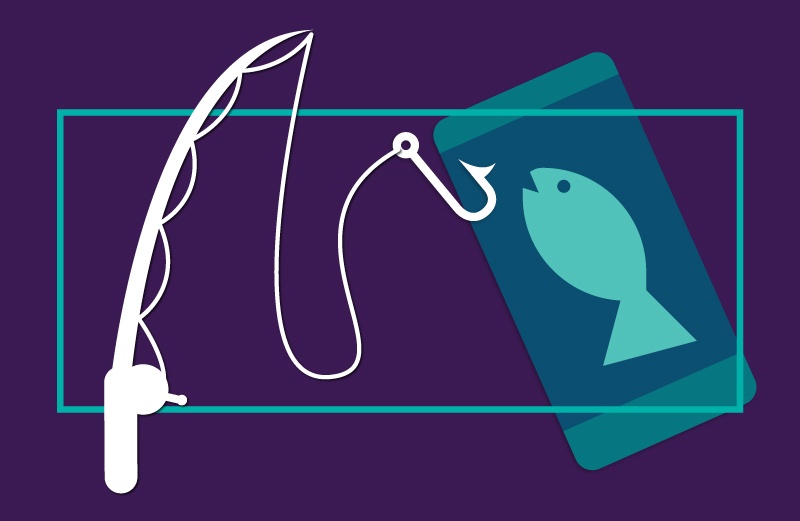
In a previous post I described how debunking misinformation is a meaningful civic action. When we discuss misinformation, we often focus on the types that elicit strong emotional responses and are trying to influence political, social or cultural views. There is another common type of misinformation that we should be paying closer attention to: It’s called “engagement bait,” and, as the name implies, we engage with it often.
Engagement bait is a type of social media post that is designed to get you to interact with (seemingly) innocuous content through likes, follows, shares and comments. These posts are often created by accounts that have two specific goals in mind: First, build a large following for the account; then, monetize that following.
Here’s one example:
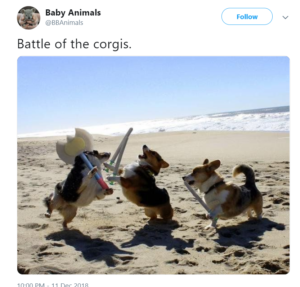
In this image, photo editing software was used to add the weapons. A reverse image search brings up several variations of the picture, along with a link to a Corgi owners discussion forum where the person who took the original photo talks about how it went viral.
As an account like this one accumulates followers, increases engagement and becomes more popular, the owner can use a service such as PaidPerTweet or SponsoredTweets to monetize its following through advertising. Eventually the owner can sell the account — and all of the followers it built up.
At this point you might be asking, “So what? Why should we care about fluff items about cute animals?” After all, these manipulated images of animals or nature scenes seem harmless enough. Social media platforms routinely serve us ads anyway, so we probably don’t notice.
But beware: Some engagement bait posts can leave you vulnerable to identity theft.
Many of us have been tagged by friends to answer questions about ourselves: What was the first concert you went to? What color was your first car? “Tag baiting” is another type of engagement bait, and it counts on you and your friends tagging each other, either in the comments of a post or in a post you share on your timeline, so that the post spreads from friend to friend.
What you may not realize while sharing fun facts about yourself is that many of these seemingly innocent questions are remarkably similar to security questions for online banking and other secure accounts. If you get enough people to respond and share, you have a gold mine of personal information.
In December 2017, Facebook announced that it was taking steps to address five specific types of engagement bait:
- Vote baiting: These often take advantage of Facebook’s reactions. Users will see two options (such as images) and are asked to “like for option 1, love for option 2.” The more people “vote,” the more popular the post appears, making it appear in more timelines. On Twitter this would be “like for option 1, retweet for option 2.”
- React baiting: This is similar to vote baiting, but usually only involves one example in the post.
- Share baiting: A post appears in your feed, asking you to “share” or “retweet” if you like it or agree with it. The more the post is shared or retweeted, the more popular it appears.
- Tag baiting: As noted above, a post asks you to tag a friend in the comments or share the post to your friend’s page. That makes the post appear in your friend’s news feed, where it encourages your friend to tag their friends. The more people get tagged, the more popular the post appears. (Seeing a pattern?)
- Comment baiting: A post asks you to write specific words or phrases in the comments section. As more people comment, the post appears to be more popular.
These types of posts try to leverage Facebook’s news feed algorithms to boost both more typical engagement bait posts (adorable animals, “amazing” nature photos, etc.) and posts for companies, products or services — often for unethical and sometimes illegal purposes. The same is true for Twitter and Instagram, though the engagement obviously varies by platform.
(Since that announcement, Facebook has expanded the demotion of “engagement bait” posts to include those written in 22 languages other than English. The company also is demoting comments that contain engagement bait, meaning that those comments are less likely to appear in users’ timelines.)
Sometimes, the engagement bait is being used to promote a legitimate business or a cause — a form of viral social media marketing. Here’s an example from the DC Extended Universe, promoting the movie Aquaman:
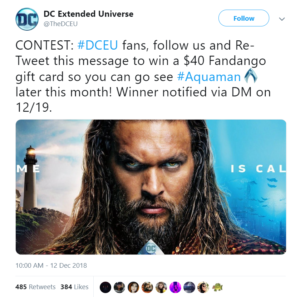
This post is designed to encourage people to follow the DCEU account and generate popularity through retweets — meaning the company doesn’t have to pay for it to be a promoted post on Twitter. Marketing efforts like this are common, but they’re still engagement bait.
Compare the DCEU promotion with this, however:
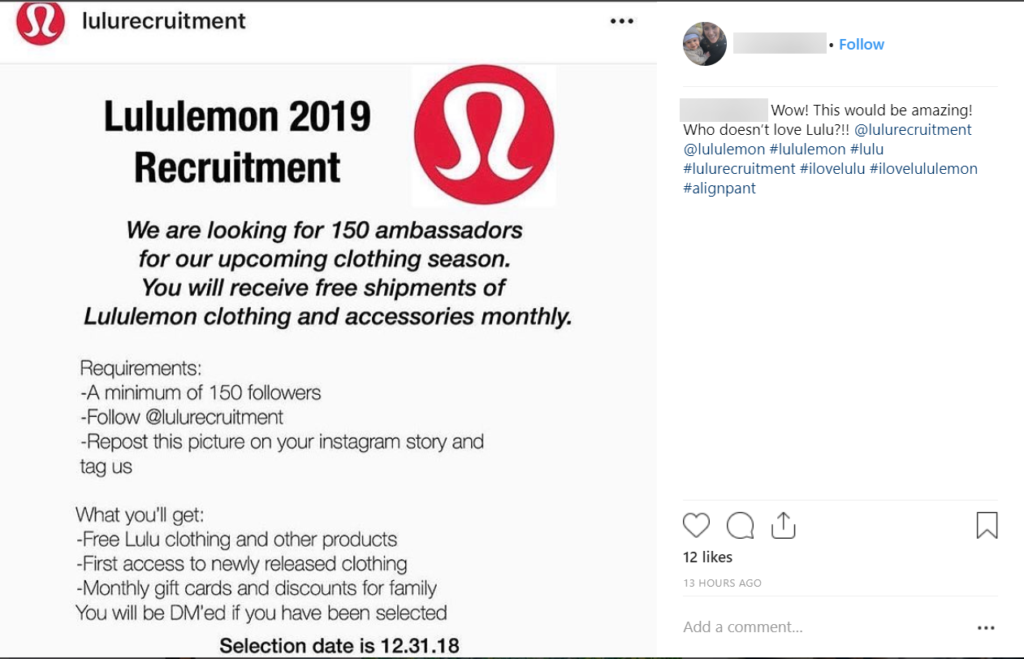
Several fake Lululemon accounts on Instagram posted an image advertising a fake brand ambassador program. This used a combination of engagement bait tactics, and it was widely shared by thousands of users. (In fact, Lululemon does have an ambassador program, but it is managed through individual stores — not online.) While the account that posted the original hoax no longer exists, the image it created continued to spread. (And the date can be manipulated, so this falsehood could continue into this year and beyond.)
Other social media platforms are also attempting to mitigate engagement bait. Last month, Twitter suspended the @oldpicsarchive account, which routinely posted images that were manipulated, were posted in false context or were complete fabrications. Such posts are debunked daily by accounts — such as @HoaxEye and @PicPedant— that follow engagement bait accounts and use digital forensics skills to debunk false images, hoaxes and other misinformation.
Understanding the difference among the various types of engagement bait is just as important as knowing how to identify news, opinion, propaganda, advertising, entertainment and raw information. It applies the same analysis skills to determine what is true and what is false. The Aquaman post is real, and that can be verified. The Lululemon post is not real, and that can also be verified. Many other forms of engagement bait use manipulated or fabricated images and other forms of misinformation to generate likes, shares and follows; these can also be verified using digital forensics and fact-checking skills.
With most forms of engagement bait, if it looks too good to be true, it probably is — so don’t like, share, follow, retweet or comment on it!
NLP’s Adams looks at migration in the context of news literacy
Messages and images that appear online, in print and on television strongly influence how people think about issues such as migration, according to Peter Adams, NLP’s senior vice president of education.
“People see different things in the way stories are reported, or in photos that are used to represent a situation or person,” Adams told Adam Strom of UCLA’s Re-imagining Migration project, noting that the way a group of migrants is identified in the media — as “an army” or as “a pilgrimage,” for example — can affect a reader’s or viewer’s perception. “If a piece of information causes you to have a strong emotional reaction, you need to be careful — because when our emotions are high, they can override our rational minds and cause us to miss key details.”
Chicago students tackle what’s real and what’s fake
When David Teeghman, a teacher at Michele Clark Academic Prep Magnet High School in Chicago, first heard about the Checkology® virtual classroom, it was a no-brainer: “I was like, ‘YES, this is a resource that my students need to have access to.’”
Navigating the information landscape these days is difficult enough for adults — and even more challenging for his students, many of whom had never seen The New York Times or The Washington Post and didn’t know the difference between an unreliable source and a credible one.
“These skills were missing in my students,” Teeghman said. “They would be susceptible to conspiracy theories, they couldn’t differentiate a real from a fake piece of content, they couldn’t tell when something had been manipulated or put in the wrong context — or had just been fabricated entirely.”
In the three years since he introduced Checkology in his classroom, Teeghman has noticed consistent improvement in his students’ ability to trust what he calls their “spidey sense” — the feeling that something isn’t right — and find the facts.
“The biggest challenge as a teenager about getting information is knowing if it’s real or not,” said Nayaisha Edmond, a student in Teeghman’s digital journalism class. “I improve day by day as I get on Checkology.”
Teeghman, too, has only praise for the platform: “I love how decentralized it is, I love how individualized it is, and I love that students can work at their own pace.” He is also impressed by the diversity of representation in the lessons. His students, he said, “can see themselves in the videos.”
But what’s most important to this educator is that his students take their newly acquired news literacy skills out into the real world, and that after they leave his classroom, they continue to apply what they have learned. Much to his delight, they do.
Once his students have finished his class, he said, he allows them to “friend” him on Facebook. One day, he noticed that a former student “unfortunately” posted something false on his feed —and he was gratified to see that other former students — in an online conversation he described as “very respectful” yet ”spirited” — “jumped in to correct that before I even had a chance to say anything!”
Watch this video from our visit to his classroom.
NLP students join Broadway stars to consider ‘true’ versus ‘true-ish’
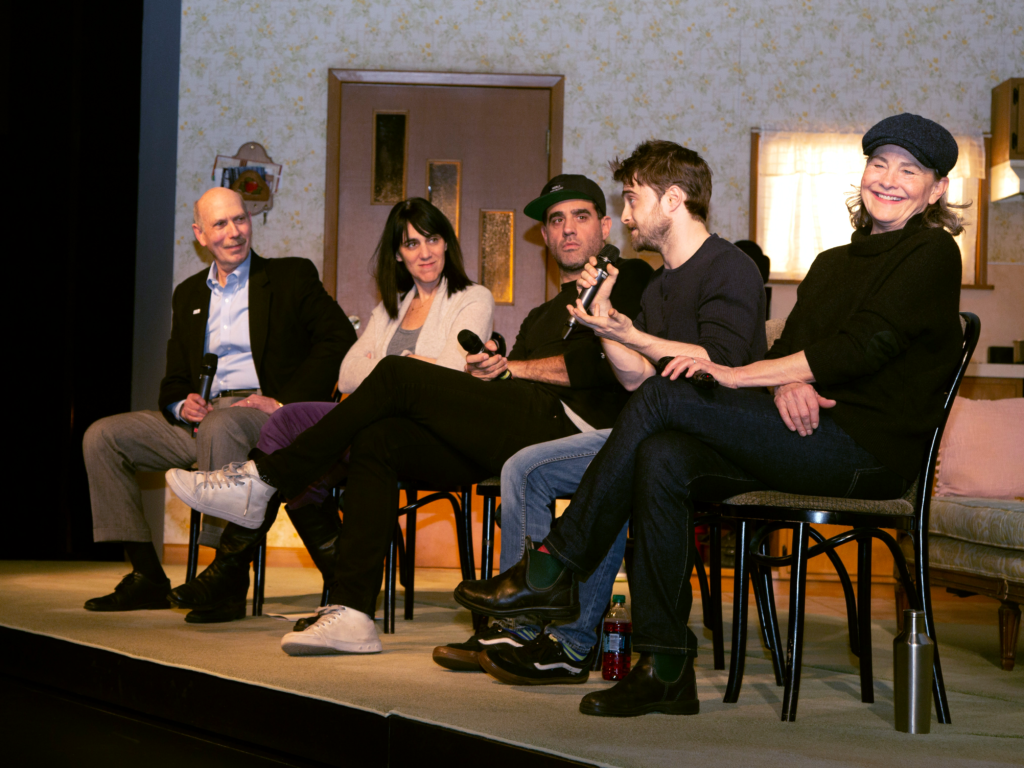
NLP’s Alan Miller (left) moderated the talkback session with Lifespan of a Fact director Leigh Silverman and actors Bobby Cannavale, Daniel Radcliffe and Cherry Jones. Photo by Miriam Romais/The News Literacy Project
“Facts have to be the final measure of truth.”
That’s what fact-checker Jim Fingal (portrayed by Daniel Radcliffe) says in the play The Lifespan of a Fact. At the News Literacy Project, we believe that the lifespan of a fact is eternal.
The play, based on a 2012 book by Fingal and writer John D’Agata (played by Bobby Cannavale) about Fingal’s fact check of an essay by D’Agata, shone a light on the tension between accuracy and creative license. And on Tuesday, students from two New York schools that use NLP’s Checkology® virtual classroom — the Young Women’s Leadership School of Astoria and the Bronx Collaborative High School — attended the play and participated in a talkback session with Radcliffe, Cannavale, Cherry Jones (who plays Fingal’s boss, a magazine editor), and the play’s director, Leigh Silverman. NLP founder and CEO Alan Miller moderated the discussion.
The 30-minute Q&A covered a number of topics, such as the importance of the arts and the ability to enjoy a movie “based on a true story” without looking up every fact upon leaving the theater. The actors also had a strong message for the students, describing how their roles in the play had strengthened their respect for journalism and for real-life fact-checkers. In fact, in preparation for this part, Radcliffe shadowed a fact-checker at The New Yorker.
“It gave me incredible faith,” Radcliffe said, noting that he was “inspired” by the “people out there who are doing this job and doing it amazingly rigorously.”
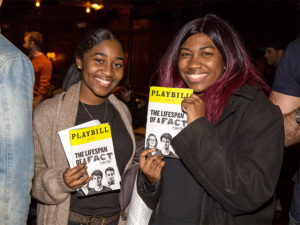
Checkology students Christina Wright (left) and Kelis Williams from Bronx Collaborative High School. Photo by Miriam Romais/The News Literacy Project
The play, in a limited run at Studio 54 in New York City, centers on Fingal’s fact check of an essay by D’Agata before it is published in a magazine. It devolves into a philosophical argument over “true” versus “true-ish”: Fingal and D’Agata disagree, for example, over whether specific numbers — how many strip clubs there are in Las Vegas, for example — must always be accurate (the fact-checker’s opinion) or can be changed to serve a literary purpose (the essayist’s opinion). The audience applauded when Fingal described facts as “the final measure of truth.”
All three actors responded to the students’ questions with answers that led to a similar conclusion: A play might not be based on facts, but the news you consume every day needs to be. Every time.
“It’s just the world we’re living in now, isn’t it, where every day people in power play fast and loose with the facts,” said Jones, adding that it’s only because of “superb journalism” that their misstatements are known.
The night ended with a group photo — and NLP bumper stickers (“My facts just ran over your fiction”) for the actors and the director as a reminder to continue to fight for facts. The students thanked Radcliffe, Cannavale, Jones and Silverman for the opportunity. Amazingly, no one asked Radcliffe anything about Harry Potter.
And that’s a fact.
To track local news coverage, curate a list of local journalists
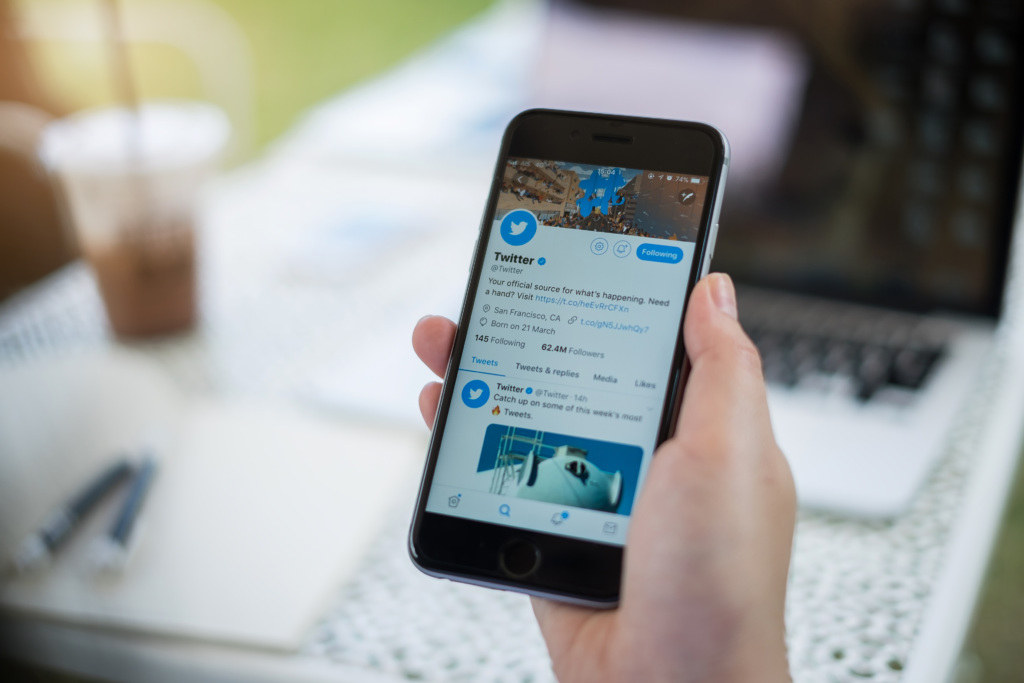
ProPublica Illinois (@ProPublicaIL) regularly uses Twitter to answer questions about journalism. Recently a reader asked: “How do you go about finding those new ideas? Is it by brainstorming? Or following on tips?”
Here’s the response from ProPublica journalist Jodi Cohen:
“Reporters are always on the lookout for ways to inform the public about the world we live in, including wrongdoing. We go to all kinds of public meetings — for school boards, city councils and park districts — and not only report the daily news but look for the bigger stories by spotting trends, questionable spending and more. We ask a LOT of questions.”
So who’s going to these meetings and asking the questions in your community? As part of a project to track local news coverage and encourage students to contact and interact with journalists, consider curating a list of local journalists. Most journalists routinely use Twitter for their work. If you have a Twitter account you use for your classes, here’s how to create a Twitter list:
- Click on your profile icon. (On a computer, the profile icon is in the upper right corner of the screen between the search box and “Tweet”; on mobile devices, it’s in the upper left corner.)
- Click on “Lists.”
- Click “Create new list.”
- Select a name for your list and give it a short description. List names cannot exceed 25 characters or begin with a number. Decide if you want the list to be private (only you can see it) or public (anyone can subscribe to it).
- Click “Save list.”
Next, add the Twitter accounts of local journalists to your list:
- Once you’ve identified an account that you want to add to your list, click the overflow icon on the journalist’s profile page (on a computer, the three vertical dots next to the Follow/Following button; on mobile devices it may be the same three vertical dots and others the gear).
- Select “Add or remove from lists.” You don’t need follow an account to add it to your list.
- A pop-up will appear with the lists you have created. If you’d like to add the journalist to a list, click the checkbox next to the list name. To remove an account from a list, simply uncheck the box.
- To see if the account was included, go to “Lists” on your profile page. Click the list name, then click “Members.” You should see the account that you added.
- Sometimes people will put “no lists” in their Twitter profile. Please respect that request.
As an example, here’s my Twitter list of education reporters. Once you have created your list and added journalists, just click on the list to see a feed of tweets from those accounts. Over time, you will undoubtedly see patterns emerge in the topics and issues the journalists are covering.
As part of this effort, look for a calendar of public meetings in your community. For example, the Chicago City Clerk’s office maintains a calendar of council and committee meetings. These calendars typically include the date, time and location for the meeting, along with general public information and agendas. If there is a meeting your students are interested in, they can contact journalists on your list to see who might be covering it. Many journalists also live-tweet the meetings so people can know what’s happening in real time, especially if the meeting is of some importance.
Finally, this list can be useful when students want to engage with journalists directly, either by asking questions or offering their perspectives about news coverage. This is one of our indicators of civic engagement and can be an excellent avenue for student voice. And it provides you with information about your community from those whose job it is to determine what’s going on: local journalists and news organizations.
Using Checkology® to improve civil discourse in the classroom
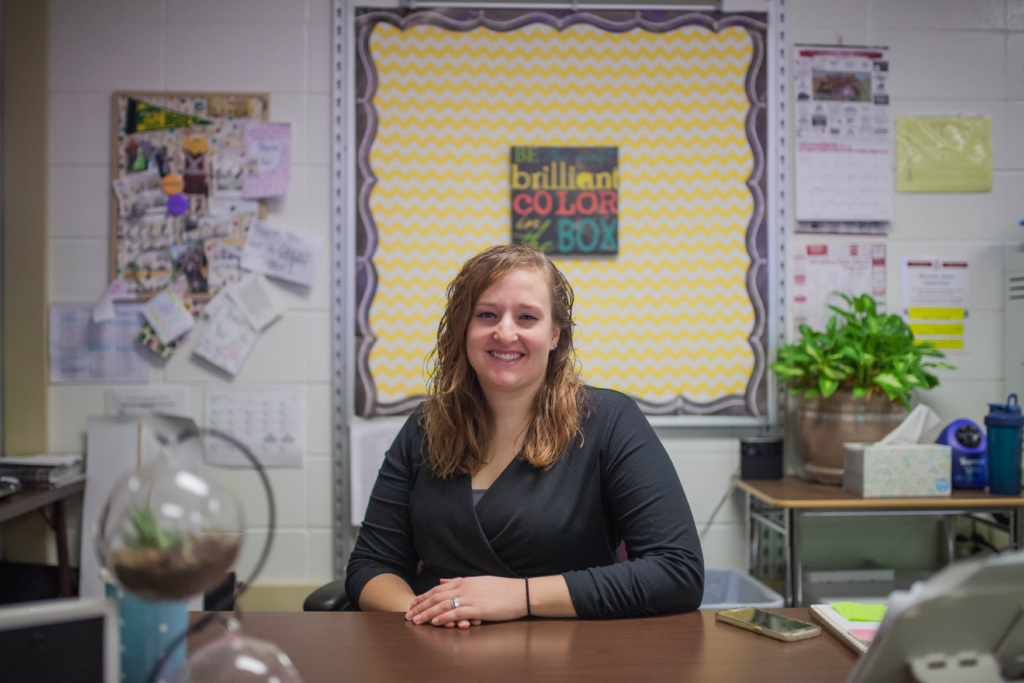
For Nicole Finnesand, integrating current events into her lessons at a middle school in the southeast corner of South Dakota was daunting — until she encountered the News Literacy Project and its Checkology virtual classroom.
She teaches in Colton, a tiny town (population 676, according to 2017 Census estimates) about 25 miles northwest of Sioux Falls. As she put it during a recent phone conversation, “Sometimes, here in the Midwest, we feel very insular.”
You might think that such a small population would be more likely to share political beliefs, but Finnesand said that the students in her seventh- and eighth-grade language arts classes reflect the fractures in the country as a whole.
They are, she said, “very divided on social issues. That was very intimidating for me as an educator to talk about someone like Kim Jong Un or Donald Trump or any political anything in my classroom, knowing that the answer to it would be very polarized.”
A search for resources
Finnesand first heard the term “news literacy” after the 2012 election, but it wasn’t until 2016 — with the country more divided than ever — that she felt compelled to research resources that might help her discuss current events with her students and show them how to think critically about what was happening in their community, their country and the world.
That’s when she discovered Checkology, and it didn’t take her long to become a dedicated user.
“I have really loved all of the resources I’ve gained and the knowledge my students are walking away with,” she said. Also important, she added, are “the skills that they’re able to apply to their own reading and consumption of media.”
As an example, she said that before they were exposed to Checkology, some of her students would produce articles from the satirical publication The Onion as truthful sources for persuasive writing exercises.
“That was shocking,” she said, “but they had no idea what that whole genre of satire is. And certainly with the political climate of our country, there were students that were just shouting ‘fake news’ at things without knowing what that meant, or knowing what they’re saying, or what is fake news. They really couldn’t tell me.”
She knew that her students were capable — but that they didn’t know how to determine what was credible news or how to find it.
Enter Checkology — and a classroom transformed.
Civil discourse
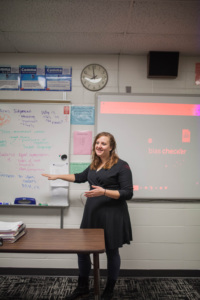 Suddenly, students began coming to class not just with opinions, but with facts and legitimate sources to back them up. They may have strongly different views on some topics, Finnesand said, but civil discourse now feels possible.
Suddenly, students began coming to class not just with opinions, but with facts and legitimate sources to back them up. They may have strongly different views on some topics, Finnesand said, but civil discourse now feels possible.
“I think the Checkology platform gave us a tool that was engaging without telling the students, ‘Here’s the right answer, here’s the way to view it,’” she said. “It gave them talking points that we could all agree on or agree to disagree on. …
“We get to use our class as a space to discuss ‘Well, what are the two sides? And how do we know what’s real and what’s not real?’”
Finnesand has watched her students gain an appreciation for — and understanding of — quality journalism. One “lightbulb moment,” as she put it, came when they learned, through the Checkology lesson “Democracy’s Watchdog,” that journalists act as detectives and hold those with power in check. They have also enjoyed tying current issues to Checkology; “The First Amendment” gave them a starting point to discuss the recent efforts by the White House press office to lift the press credentials of CNN reporter Jim Acosta.
It’s a challenge for anyone, adults included, to consume news responsibly and discuss it civilly. But Finnesand says she has seen a real change in her students since introducing Checkology, and she believes that they can be agents of change.
“I’m learning with my students what kinds of things we can read about and agree to disagree and work on,” she said, adding: “Hopefully our country isn’t always so divided and we can still have conversations about issues without alienating each other.”
News literacy and conspiracy theories

Misinformation spreads rapidly on social media following natural disasters, mass shootings, terrorist attacks and other dramatic news events. In addition to seeing doctored photos and patently false “breaking news,” we’re also likely to be bombarded with conspiracy theories — another subset of misinformation. Since many of these involve alleged actions by the government, we need to make sure that our students have the news literacy skills they need to prevent them from believing these falsehoods and becoming distrustful of the government.
In his book The United States of Paranoia: A Conspiracy Theory, published in 2013, Jesse Walker defined five types of conspiracy theories:
- The “Enemy Outside” refers to theories based on figures outside a community alleged to be scheming against it.
- The “Enemy Within” finds the conspirators lurking inside the nation, indistinguishable from ordinary citizens.
- The “Enemy Above” involves powerful people manipulating events for their own gain.
- The “Enemy Below” features the lower classes working to overturn the social order.
- The “Benevolent Conspiracies” are angelic forces that work behind the scenes to improve the world and help people.
In a 2018 study (PDF download) of people who believe in conspiracy theories, Mattia Samory and Tanushree Mitra of Virginia Tech’s computer science department examined 10 years of posts (and four crisis events) in the Reddit community r/conspiracy and defined three types of participants:
- “Veterans” are long-term active members of r/conspiracy.
- “Converts” were active in other discussions on Reddit and joined r/conspiracy in response to a specific crisis.
- “Joiners” became Reddit users and joined r/conspiracy specifically in response to a crisis or other event.
How do conspiracy theories manifest on social media? Let’s take a hurricane as an example. Amid the misinformation and hoaxes that typically appear before, during and after such storms (such as the inevitable “shark on the flooded highway” image), posts claiming that the government can alter the weather will start appearing. There will be references to chemtrails (the condensation trails from aircraft engines that conspiracy theorists say are laden with weather-changing chemical or biological agents) and to HAARP, an actual research program, based at the University of Alaska at Fairbanks, that studies the properties and behavior of the ionosphere. These posts will often link to sites or discussion groups that have compelling and detailed descriptions of how HAARP and other government programs can control the weather.
Without the skills to critically evaluate the content and sources for these posts, sites and other discussion groups, students can easily be persuaded that what’s being said is factual. They may even contribute to the viral nature of the ideas by sharing them — in short, becoming a “joiner.”
Samory and Mitra found that “joiners” demonstrated a very high level of engagement in the online discussions, posting longer and more detailed content that was comparable to that of the community’s “veterans.” “Converts” in these discussions tended to come and go, with lower levels of engagement overall. Perhaps most troubling is that the longer the “joiners” engaged in these communities, the more likely they were to become “veterans.”
This is where the importance of news literacy comes in. People who believe conspiracy theories are not necessarily the stereotypical “tinfoil hat” types. In a 2017 study, Stephanie* Craft, Seth Ashley* and Adam Maksl found that anyone can end up believing a conspiracy theory, since most of them are structured with a compelling story that provokes strong emotional reactions and has a connection to an existing bias or belief.
For their study, Craft, Ashley and Maksl surveyed 397 people to determine what they knew about the news media and the extent to which they believed several conspiracy narratives. Perhaps not surprisingly, they found a correlation between respondents’ knowledge about how the news media works and belief in conspiracy theories: “The greater one’s knowledge about the news media — from the kinds of news covered, to the commercial context in which news is produced, to the effects on public opinion news can have — the less likely one will fall prey to conspiracy theories,” the researchers wrote.
At the News Literacy Project, we emphasize the importance of news literacy as an antidote to misinformation and a catalyst for becoming a critical consumer of news and information. Discussing conspiracy theories with students can be tricky, and doing so is not typically part of the curriculum. But if students fall prey to this type of misinformation, their ability to be critical and open-minded about all types of information, including news, is compromised. And if their belief in conspiracy theories leads them to become fearful and cynical about the government, they are less likely to become active, informed and engaged participants in our country’s civic life.
*An earlier version of this post misspelled the first name of Stephanie Craft (not Stefanie) and the last name of Sean Ashley (not Astley).
Five ways to celebrate Media Literacy Week
Nov. 5-9 is Media Literacy Week — our favorite week of the year, when champions of news and media literacy raise awareness of the critical need and available tools to discern and create credible information as students, consumers and citizens.
Here are some things you can do each day during Media Literacy Week to support these efforts:
Monday: Double-check your facts (before you vote). Take The Easiest Quiz of All Time, then watch our video to see how others did. Warning: It’s not that easy!
Tuesday: Check your ballot! It’s Election Day, and news literacy education empowers the well-informed voters who keep our democracy strong.
Wednesday: Check in. Visit our online “booth” at the virtual fair hosted by the National Association for Media Literacy Education. On Wednesday between 3 and 5 p.m. ET, our own Jordan Maze will answer questions about our programs and about news literacy in general.
Thursday: Image check. People instinctively trust images more than words — but many images are manipulated or taken out of context. Brush up on your reverse image searching skills so you can teach someone else how to find out if that compelling photo is real or fake.
Friday: Check and correct (kindly). If you see that someone has shared misinformation online, let them know in the spirit of giving facts a fighting chance.
Everyone has to work harder than ever these days to avoid misinformation and manipulation. Keep fighting for facts!
Before you vote, pop your filter bubble by getting news from all sides

Americans head to their polling places in less than two weeks — and in each election cycle, it’s becoming more and more difficult to make sure that we actually know what we need to know before casting our ballots. (Check out our “Double-Check Your Facts” PSA to see how people did on The Easiest Quiz of All Time.)
To be active, engaged participants in the civic life of our communities, we all must take proactive steps to better understand the issues we care most about — especially since Facebook, Twitter and other social media have become, for many of us, our primary sources of information. By relying on these platforms for news, we’re likely to become encased in a filter bubble — a phenomenon that, in essence, limits what we read, watch and hear.
We end up inside these bubbles when the algorithms used by these platforms attempt to select content that they feel we want to see and that aligns with what they perceive as our personal preferences. And when our online friends and connections share our opinions, we’re trapped even more: We become insulated from opposing viewpoints, making it increasingly difficult to understand all sides of the issues. (Another description for this is the “echo chamber” effect — meaning that our beliefs are repeated and amplified by our connections.)
How do we pop these filter bubbles? We can’t expect any of the platforms to do it for us. We have to be proactive by engaging with new sources of information. Here are a few that will help.
Blue Feed, Red Feed
This site, from The Wall Street Journal, was launched several months before the 2016 presidential election. The concept is simple: Click on one of eight pre-selected topics (such as health care or immigration) and scroll through a series of Facebook posts that have been shared from sources that a study by Facebook has identified as “very liberal” or “very conservative.” Each post in the feeds has at least 100 shares, and the sources for the posts have more than 100,000 followers.
The strength of this tool is that it allows users to see the latest arguments for their selected issues side by side. People from across the political spectrum can consider their own beliefs against opposing viewpoints to come to a clearer understanding of their position — or perhaps change it to a new view.
ISideWith.com
This site was started in 2012 by Taylor Peck, a political analyst and marketing expert, and Nick Boutelier, a web designer and developer, who wanted to find ways to increase voter engagement and knowledge. Users can choose from more than 30 countries and select from 22 languages (including several variations of English).
For U.S. voters, the site has a 2018 midterm voter guide that asks users to rate their beliefs on a wide range of issues — economic policy, foreign policy, education, health care and more — and then presents information about candidates whose views concur with the users’. There are also guides to candidates for Congress and state legislatures. In the Polls section, users can see how others have answered the questions about their beliefs on issues, with both sides represented on the same page.
This site has an almost overwhelming amount of information — but it’s this comprehensiveness that makes ISideWith an excellent resource.
Vote Smart
Originally known as Project Vote Smart, this nonpartisan organization was founded in 1992 by Richard Kimball, a former Arizona state senator who had run unsuccessfully for the U.S. Senate against John McCain in 1986. Users can enter their ZIP code to see who currently represents them (federal, state and local offices) and who is running for office; when they click on a name, they can learn more about the official’s or candidate’s voting record, positions, speeches and funding. Similar to ISideWith, Vote Smart created Vote Easy, which allows users to explore candidates running for federal office (in 2018, the U.S. Senate and the U.S. House) and their positions on key issues.
Other resources
The challenge with sites such as Vote Smart and ISideWith is that they tend to focus on enabling voters to find candidates whose political beliefs reflect their own. This actually serves to reinforce the filter bubble. If we look only for candidates with positions that agree with ours, we’re not really learning about opposing viewpoints.
ProCon.org focuses on the issues, not individual candidates. Users choose from an extensive list to see arguments for and against specific topics. Examples include:
- Should student loan debt be easier to discharge in bankruptcy?
- Should the drinking age be lowered from 21 to a younger age?
- Should marijuana be a medical option?
- Should bottled water be banned?
The site provides citations for all sources listed in the results. The arguments are listed side by side for easy comparison.
BalancedPolitics.org also lists arguments for specific positions side by side and provides background and links to additional resources. Finally, Debate.org is an online community (free to join) where members can vote and contribute their own opinions to current issues.
Civic engagement is more than voting. We must find ways to increase our knowledge and understanding of the issues that affect us and our communities. To do so, we first must be aware that we are inundated with information through our social media feeds and that we must critically evaluate everything that we encounter. Next, we need to seek out content that shows us opposing positions and ideas. What we find can either reinforce what we already believe or allow our positions to evolve.
When we burst our filter bubbles and are ready for our positions to be challenged, we’re taking an uncomfortable but important step. It’s one we have to take, though, if we want to become active and engaged participants in civic life — and informed voters.
Before you vote, double-check your facts
Election Day is just two weeks away — and in each election cycle, it gets more and more difficult for us to make informed decisions before casting our ballots. As political rhetoric tips toward misinformation frenzy, it’s increasingly difficult to discern fact from fiction and truth from outright falsehoods.
Russian troll farms, bots and other types of political chicanery are certainly part of the problem — but the perception that misinformation is spread only by people who are intentionally trying to muddy the waters is far from accurate. It’s the unintentional sharing of misinformation that really causes misinformation to spread. Certainly, most of us don’t go out of our way to share bad information with our family members and friends. But that doesn’t mean we haven’t — even a casual “like” or retweet can give misinformation a broader audience.
So we at the News Literacy Project have teamed up with Edelman, a global communications marketing firm, to create a public service campaign that we’re calling The Easiest Quiz of All Time. Hosted by comedian and filmmaker Mark Malkoff, this humorous street quiz tests passers-by about frequently misremembered facts. Contestants learn, for example, that Darth Vader did not actually say “Luke, I am your father.” They also learn that overconfidence and a failure to double-check what you think you know can lead to incorrect answers — and, potentially, uninformed decisions.
As we were making this video, I was reminded once again that the skills to be a well-informed and active participant in civic life should not be taken for granted. If you see something that sounds like it might not be true, take a minute to find out before you pass it on. The spread of misinformation is not inevitable, and stopping it comes down to each of us taking a little time to double-check the facts.
We’re urging you to share this video between now and Election Day with your family, your friends, your neighbors, your co-workers and your networks, using the hashtag #doublecheck.
And most importantly, remember to vote — after double-checking your facts!
‘Practicing Quality Journalism’: ¡Ahora en español!
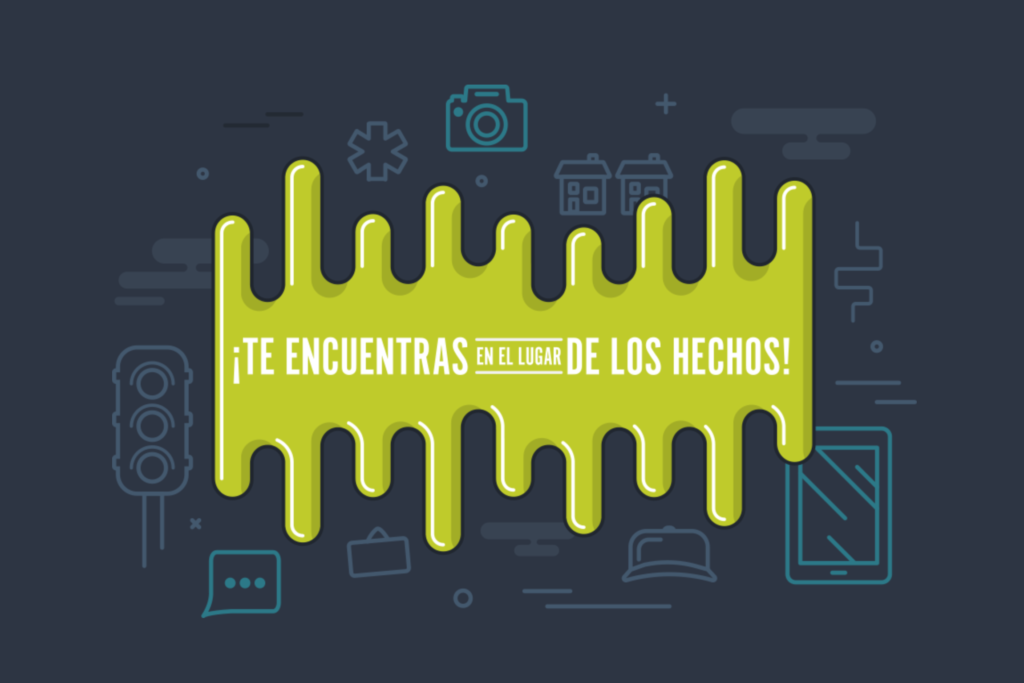
We are diversifying our news literacy efforts in all sorts of new ways, and here’s one that’s truly exciting: One of the most popular lessons in our Checkology® virtual classroom is now available in Spanish!
“Practicing Quality Journalism”/“Practicando el periodismo de calidad” is a game-like simulation in which students assume the role of rookie reporters to cover a breaking news event. The lesson is taught by Enrique Acevedo — news anchor of Noticiero Univision: Edición Nocturna (Univision News: Late Edition), special correspondent for the Fusion Media Group and an experienced journalist who has covered breaking news around the world for print, broadcast and digital media. In this lesson, which he delivers in both English and Spanish, Acevedo guides students as they work to meet the standards of quality journalism while reporting on an accident that has caused a tanker truck to leak a mysterious green slime.
“I’m thrilled to be part of NLP’s effort to reach Spanish-language audiences,” Acevedo said. “I can’t think of a better contribution to the future of journalism and the free press than our partnership with NLP. As journalists, we need to make sure everyone has access to these important tools.”
“Practicing Quality Journalism”/“Practicando el periodismo de calidad” is available with either Basic or Premium levels of access to the virtual classroom. Gracias, Enrique — and thanks also to the Facebook Journalism Project for making this, our first lesson in Spanish, possible!
To sign up for Checkology or to learn more, click here.
A guide to understanding — and debunking — misinformation
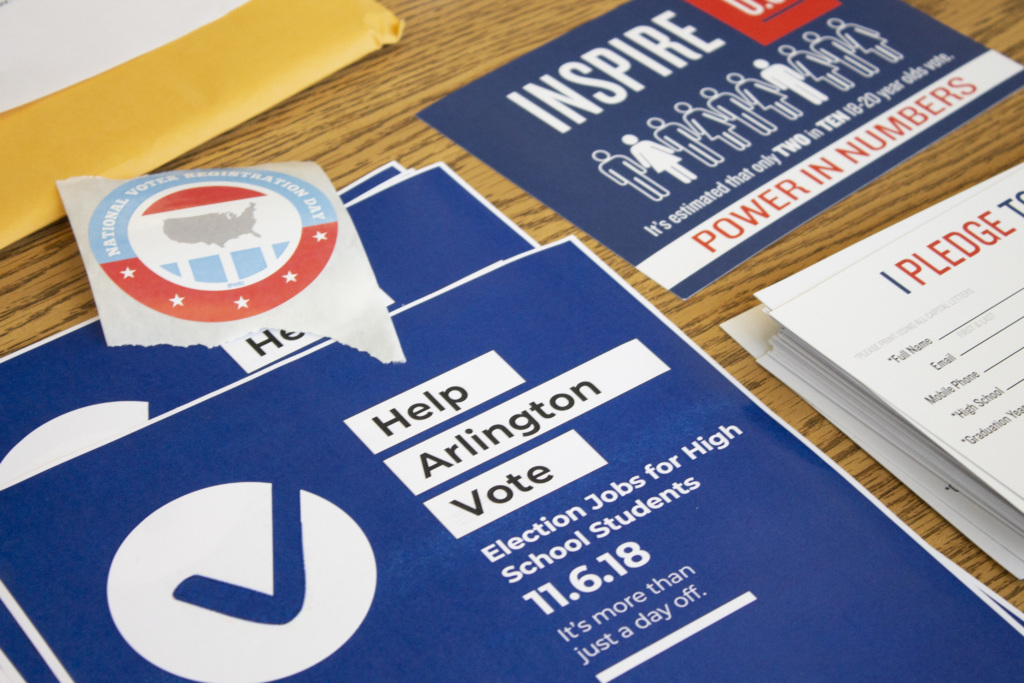
Civic engagement in action: A voter registration table, hosted by the League of Women Voters, at Wakefield High School in Arlington, Virginia.
As civics education is increasingly part of the national conversation, and as school districts and state legislatures increasingly call for more of it, we need to have a good understanding of what civic engagement looks like for young people in the 21st century. How many civic actions from previous generations remain unchanged? How many have been affected, in both good ways and bad, by the enormous technological changes of the last two decades? And what new forms of civic engagement do we need recognize, refine and support in the classroom?
NLP’s approach to civic engagement consistently builds on news literacy as a foundation. After all, credible information is the very basis for civic literacy and engagement; it is what drives meaningful civic actions. If we don’t have that foundation, misinformation can cause people to take actions that are civically disempowering — not in their interests, or in the best interests of the republic.
Here are 10 important indicators of civic engagement that we’ll be discussing over the coming weeks (these assume that students already have the key skills needed to navigate today’s information landscape):
10 Indicators of Civic Engagement
- Pay attention to and understand how misinformation spreads on social media and debunk misinformation or false comments in a constructive, responsible manner.
- Pay attention to, and understand, issues being debated locally, statewide or nationally.
- Participate in a discussion about politics or current events — in school, with my friends or family, or online.
- Cast a ballot in an election (when I’m old enough) as a well-informed voter.
- Pay attention to, and understand, issues relating to individual freedom of expression and protected speech in the United States and abroad.
- Contact a reporter or news organization by email, social media or phone.
- Pay attention to, and understand, ongoing discussions about journalism and the state of the news media, including press freedom in the United States and internationally.
- Document something in my community and share it with others.
- Question or engage in conversations with my elected officials by email, social media or phone.
- Volunteer or advocate for a cause, idea, mission-driven organization or political campaign — one that aligns with my personal beliefs, that I’ve researched and that I have a deep understanding of.
In the coming weeks, I’ll be posting more detailed explanations and examples of how to connect specific news literacy skills with these civic actions. Today, let’s start with the first indicator: Pay attention to and understand how misinformation spreads on social media and debunk misinformation or false comments in a constructive, responsible manner.
As students become more immersed in the news and other information that surrounds them, the more misinformation, hoaxes, viral rumors and propaganda they will come across. Critically evaluating what they read, watch and hear and identifying the various types of misinformation they encounter are critical news literacy skills. Once they can do this, they can take an active, constructive role in debunking misinformation.
On Sept. 20, this tweet showed up in my feed:
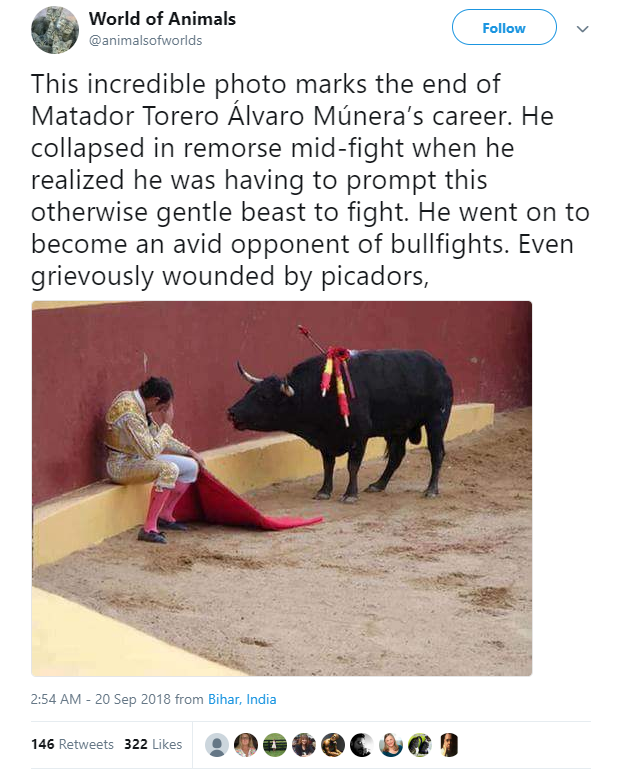
To be sure, it’s a powerful image and message — one that animal lovers would readily agree with and quickly retweet. My critical eye thought that it was a little too perfect. There isn’t enough information in the tweet to provide credible evidence for what it says. When I scrolled through the replies, I quickly discovered that a few people had already called out the image.
I did a reverse image search and found two key articles debunking both the image and the explanation. It turns out that the photo is of a different bullfighter. In addition, what the bullfighter is doing is actually part of the act. As explained in the blog The Last Arena and confirmed by the fact-checking site Snopes.com:
“Sitting on the ‘strip’ around the ring after the sword has been placed in the bull is a known desplante, or act of defiance, within the part-scripted, part-improvised spectacle that is the corrida de toros.”
The bullfighter mentioned in the original tweet did eventually become an animal rights activist, but only after he was left permanently disabled after being gored by a bull.
This tweet reinforces the importance of reading through the comments or replies before retweeting. Others responded to it by sharing the same links I referenced above, tagging it #fakenews, calling out the original tweet for “harming the cause” or simply describing it as “utter tosh.” Yet some replied favorably, accepting the tweet as being true without checking further.
Some of the messages debunking the tweet were more effective than others — and the key to this civic action is teaching students the most effective ways to do this. In two published meta-analyses of studies about correcting misinformation from a variety of topics, researchers described strategies that are more effective at swaying beliefs and countering false information – along with those which are ineffective.
In their 2017 study, “Debunking: A Meta-Analysis of the Psychological Efficacy of Messages Countering Misinformation,” authors Man-pui Sally Chan, Christopher R. Jones, Kathleen Hall Jamieson and Dolores Albarracín made three key recommendations.
- Reduce the generation of arguments in line with the misinformation.
- Create conditions that facilitate scrutiny and counterarguing of misinformation.
- Correct misinformation with new detailed information, but keep expectations low.
If the debunking message includes arguments that are in line with the misinformation, it’s “difficult to eliminate false beliefs,” they wrote. The emphasis should be on the counter-argument or on the facts being used to debunk the misinformation — not on the original belief or false claim. Simply labeling the misinformation as being “wrong” or “false” also makes accepting the debunking message less likely.
Students should create a counter-message that is detailed and supported by facts — but don’t expect it to always work. The stronger someone believes misinformation initially, the harder it is to change their view.
A similar study, “How to unring the bell: A meta-analytic approach to correction of misinformation” by Nathan Walter and Sheila T. Murphy, highlights other factors to emphasize when debunking misinformation:
“Appeals to coherence tended to be best at correcting misinformation, compared to fact-checking and source credibility. In other words, providing alternative explanations that were internally coherent was more successful than providing ratings of the accuracy of specific statements or highlighting the credentials of a source.”
Relating to the recommendation of keeping expectations low, Walter and Murphy found that it was more difficult correcting misinformation relating to politics and science than misinformation in other areas, such as health, crime and marketing.
If you want your debunking message to be read loud and clear:
- Don’t just label something as “wrong,” “false” or “fake.”
- Don’t focus solely on fact-checking the content or source of misinformation.
- Make your message clear and detailed, and support it with facts.
- Emphasize an alternative explanation that brings clarity to the subject.
- Don’t expect everyone to readily accept your message.
People who pass on misinformation shouldn’t feel as if they are being personally attacked. In a way, a good debunking message is one in which those who shared a falsehood feel as if they came to the right conclusion by themselves — with a little nudge from you.
New line of support for the News Literacy Project (and democracy)
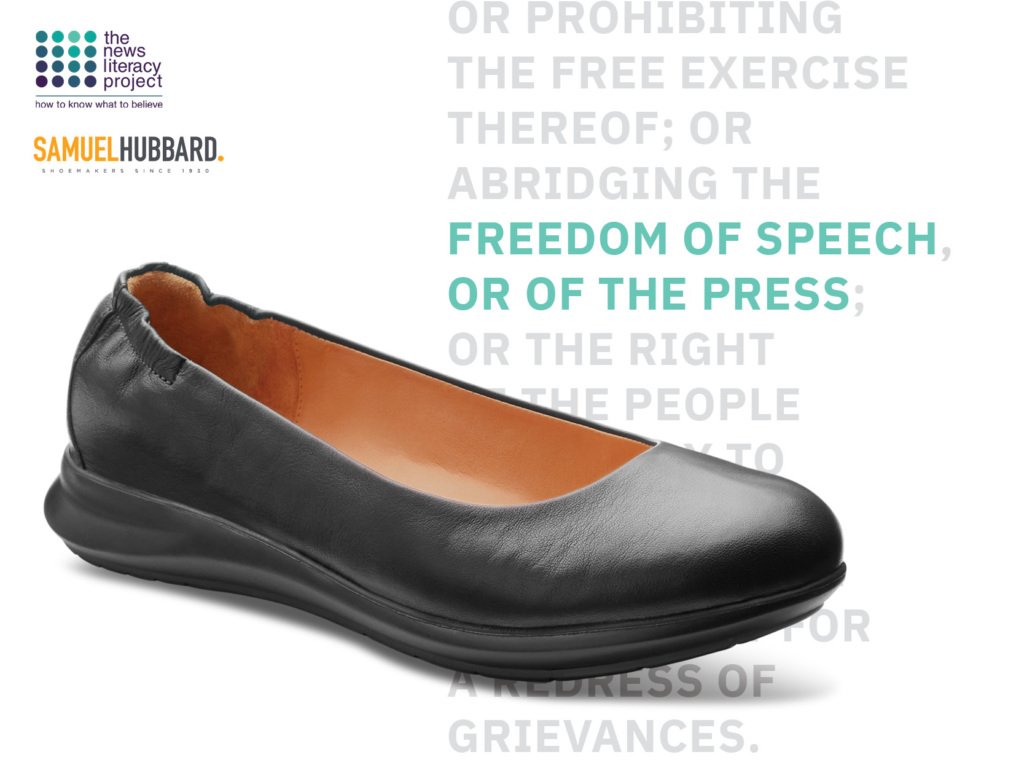
I’m always pleased to announce new partners in news literacy, but this one is especially gratifying because it offers support in a distinctive way. The Samuel Hubbard Shoe Company has shown generosity matched by creativity in pledging to give $20 to the News Literacy Project for every pair of shoes bought online from its new Freedom Shoe line for women.
Needless to say, I’m thrilled that the donations will help us expand our news literacy education efforts by sponsoring our weekly newsletter, The Sift, for the entire school year. But here is, well, the kicker: The First Amendment is literally built into the offer.
To be exact, every shoe that is part of this line will have the First Amendment engraved on its sole. That means that when people buy a Freedom Shoe, they are bearing (and wearing) a foundational element of our Constitution.
Samuel Hubbard will donate to us through March 1, 2019, or until donations reach $100,000, whichever comes first. It’s also promoting us in a company brochure about the First Amendment that will be shipped with every pair — which means even more people will learn about us and champion news literacy in their communities.
We at the News Literacy Project are pushing to get into as many schools as possible to help students understand the powerful role the press plays in our country and the protections guaranteed under the First Amendment. This partnership with Samuel Hubbard promises to reach the public in a whole new (and fun) way, giving people instant access to a crucial part of news literacy and of our democracy.
A recent study found that only 3 percent of Americans know all five rights guaranteed by the First Amendment (though 36 percent can name at least one). I make that point to underscore how this agreement will provide support in multiple ways: If you wear these shoes, you are supporting our cause financially as well as spreading word of the First Amendment. And there is every reason to believe that you’ll be providing great support for your feet, too!
Samuel Hubbard Shoe Company founder and CEO Bruce Katz says this about designing the Freedom Shoe line: “The First Amendment is a simple and elegant statement of where our freedom begins — and it’s essential that today we remember what it stands for.”
Thank you, Samuel Hubbard!
Evaluating unnamed sources in news reports
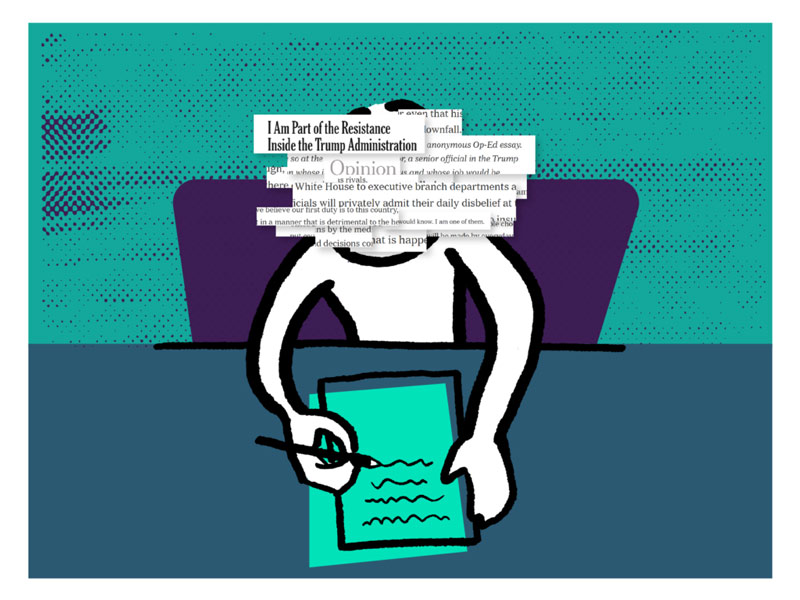
On Sept. 5, the editors of The New York Times’ opinion page took what they called “the rare step of publishing an anonymous Op-Ed essay.” The action raises an important issue in journalism and an opportunity to teach students about evaluating unnamed sources in the news.
By “unnamed sources,” I am referring to the people who provide information published in news reports, editorials and other opinion pieces but whose names are not given. (It’s important to remember that the source’s identity is unknown to us — the readers, viewers and listeners — but is known by the journalist and, usually, at least one editor at the news organization.)
Being a critical consumer of news includes understanding and evaluating different types of sources — such as official sources, eyewitness sources, raw video and documents — to determine whether a news article is credible. Evaluating the words of individuals who are not named requires a closer look at both the journalist and the news organization.
Most news articles routinely attribute key facts to a source who is identified by name and, often, by title — information telling us why the source is in a position to know about and comment on the topic. When the source is unnamed, news consumers should consider two key elements: why the source desires anonymity, and what is behind the source’s decision to share this information.
Here is how The Associated Press, a global news agency that produces more than 2,000 news stories per day, defines the terms used in granting anonymity (parenthetical information in the definitions is not from AP). Other news organizations may have their own definitions of these terms. Both the reporter and the source must agree to these ground rules before an interview.
- On the record: The information can be used with no caveats, quoting the source by name.
- Off the record: The information cannot be used for publication. (But the reporter can use this knowledge to get the information verified elsewhere.)
- On background: The information can be published but only under conditions negotiated with the source. Generally, the sources do not want their names published but will agree to a description of their position. (Other news outlets may refer to this as “not for attribution”; some may even distinguish between “not for attribution” and “on background.”)
- On deep background: The information can be used but without attribution. The source does not want to be identified in any way, even on condition of anonymity.
Why do journalists use unnamed sources, especially since it might endanger the trust the public has in their work? After all, the public should know whether these sources are in a position to be fully informed on the matter or are offering a skewed version that serves their purposes, not ours.
The news organization’s obligation
For starters: Good news organizations do not publish information from unnamed sources without consideration and thorough vetting. As reporter Jason Grotto of ProPublica Illinois wrote, his organization’s ethics guidelines allow sources to remain unnamed “only when they insist upon it and when they provide vital information,” “when there is no other way to obtain that information” and when the journalist knows that the source is “knowledgeable and reliable.”
Typically, journalists share the names of these sources with their editors, who assess whether those criteria are met.
As the Society of Professional Journalists’ ethics code notes, “Consider sources’ motives before promising anonymity. Reserve anonymity for sources who may face danger, retribution or other harm, and have information that cannot be obtained elsewhere.”
Motives, of course, vary. The source may be acting as a whistleblower, exposing corruption or other illegal conduct. The source may feel compelled to share information with the public that is being withheld for some reason. Or — and good journalists know this — the source might have personal interests at heart. That does not necessarily disqualify the accuracy of the information, but it is why one standard of quality journalism is verification of facts by multiple sources.
News organizations that use unnamed sources owe it to their readers, viewers and listeners to clarify, as much as possible, why the source was granted anonymity, and why the source’s motives did not invalidate the value of the information.
The news consumer’s obligation
The challenge for news consumers is that the use of unnamed sources provides no outside way to verify what the journalist has written. We must decide whether to trust the journalist and the news organization. Fortunately, there are some actions we can take that help build that trust.
When evaluating a news article that uses unnamed sources, take a step back and engage in lateral reading* about the journalist who wrote the article and the news organization that published the report. Take a look at other articles by that journalist: How often does he use unnamed sources? (Is he lazy, or is he privy to officials who have great — but classified — information?) Does she write about this particular subject regularly, indicating that she has in-depth knowledge? Does the journalist also write opinion pieces? (If so, this could indicate a bias that must be evaluated.)
Consider, too, whether the journalist has provided sufficient context to determine whether the source is reliable and credible. In “When To Trust A Story That Uses Unnamed Sources,” Perry Bacon Jr. of FiveThirtyEight gives five details that readers should look for when considering a story that uses unnamed sources. His follow-up post, “Which Anonymous Sources Are Worth Paying Attention To?,” explains how to evaluate the description applied to an unnamed source — such as “a Pentagon official,” “a person familiar with” or “a law enforcement official.” The more details the journalist provides about a source, the more comfortable we can be trusting what that source has to say.
More fundamentally, has the article explained why the source was granted anonymity? Explaining why a source isn’t named — for example, attributing behind-the-scenes information about congressional action to “a committee aide who was not authorized to speak publicly about the meeting” — is something we can evaluate. Check to see if the news organization has a published policy on using unnamed sources (such as these from The Washington Post and NPR).
We shouldn’t dismiss the use of anonymous sources out of hand. Particularly when reporting about the government, journalists often must rely on sources who have a justifiable concern about being named; at the same time, they must recognize that using anonymous sources may make their work appear less credible. In 2013, Margaret Sullivan, then the public editor of The New York Times, quoted a national security editor who said of government sources, “It’s almost impossible to get people who know anything to talk,” especially on the record. “So we’re caught in this dilemma.”
As for that op-ed in The New York Times, the author is described as “a senior official in the Trump administration whose identity is known to us and whose job would be jeopardized by its disclosure.” Whether the opinion page editors made a good decision in publishing the piece remains up for debate. And that’s what we, as critical consumers of news, should be able to do: Evaluate the available information and make our own determination about the credibility of what was published.
Further reading:
- Chapter 59: Sources of information (The News Manual)
- “Which Anonymous Sources Are Worth Paying Attention To?” (Perry Bacon Jr., FiveThirtyEight)
- “When To Trust A Story That Uses Unnamed Sources” (Perry Bacon Jr., FiveThirtyEight)
- “How do you use an anonymous source? The mysteries of journalism everyone should know” (Margaret Sullivan, The Washington Post)
- “Using anonymous sources with care” (H.L. Hall, Journalism Education Association)
- “What Does ‘Off the Record’ Really Mean?” (Matt Flegenheimer, The New York Times)
**The lateral reading concept and the term itself developed from research conducted by the Stanford History Education Group (SHEG), led by Sam Wineburg, founder and executive director of SHEG.
Teachers, it’s time to embrace Wikipedia
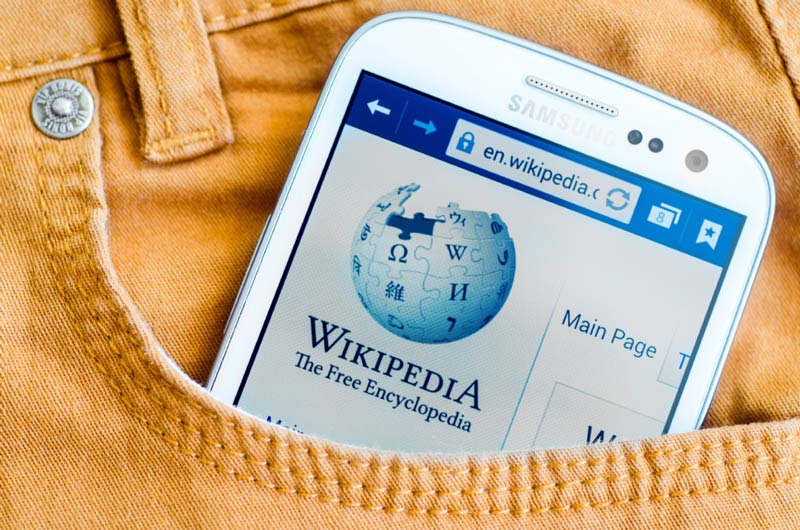
Roman Pyshchyk / Shutterstock.com
Fact-checking is an essential skill that we need to teach students — and to reinforce as a habit for daily consumption of news and other information. Do a search on just about any topic, and there is a high likelihood that a Wikipedia article will come up in the initial results.
You may find this next statement surprising, but hear me out: When it comes to verifiable, objective facts, Wikipedia is an excellent starting point for fact-checking, and one we should encourage students to use.
Let’s start by talking about what Wikipedia is and whether it should be considered reliable.
According to its own “about” page, “Wikipedia is a portmanteau of the words wiki (a technology for creating collaborative websites, from the Hawaiian word wiki, meaning ‘quick’) and encyclopedia. Wikipedia’s articles provide links designed to guide the user to related pages with additional information.”
In effect, Wikipedia is designed to be a jumping-off point to additional, more detailed sources. This is a particular strength in that articles without proper referencing can be rejected. Sources that are not acceptable include:
- Blogs.
- Social media.
- The subject’s own website.
- Press releases.
- Tabloid journalism.
There is a learning curve for those contributing to Wikipedia. They must learn to write according to Wikipedia’s standards; they also must learn the technical aspects of editing articles. According to Wikipedia, “All articles must strive for verifiable accuracy, citing reliable, authoritative sources, especially when the topic is controversial or is on living persons. Editors’ personal experiences, interpretations, or opinions do not belong.” Contributors may be asked to justify their edits. Some edits may be changed by another user.
Wikipedia’s standards, you’ll see if you review them, are quite high and follow many of those set forth for academic writing or journalism.
A common criticism of Wikipedia is that anyone can edit an article at any time. This is not entirely accurate. While most articles can be edited by anyone, even anonymously, there are different levels of protection for articles to prevent acts of vandalism and partisan “edit wars.” For some of these levels, only a confirmed user (registered users with accounts created a specified number of days ago and with a number of accepted edits to articles) can edit an article; under the most restrictive protection, only “official” Wikipedia editors can make changes. These levels of protection are generally determined by either moderators or Wikipedia administrators.
The articles on Wikipedia are continually monitored by site administrators, moderators, confirmed users and bots. (Bot aren’t always bad: According to Wikipedia, a bot is an “automated tool that carries out repetitive and mundane tasks to maintain the 45,699,154 pages of the English Wikipedia. Bots are able to make edits very rapidly” for routine edits.) Some articles are monitored more closely than others, but generally, if someone vandalizes an article by editing it to include false or malicious information, corrections are made in a relatively short period of time.
Article vandalism is one of the most common problems on the site. A study published in 2015 showed that controversial topics (specifically in science, such as evolution and global warming) had more edits and word changes than articles on non-controversial topics. But the study also showed that many of those edits were corrections to the vandalism. I would argue, as did the authors, that this means we should evaluate Wikipedia as critically as we do any other source, rather than disregard it entirely.
That criticism that anyone can edit Wikipedia at any time? In my view, that’s a strength, because the overwhelming number of people who edit Wikipedia do so to make the site better and more useful as a source of information. That is why I joined as a confirmed user and contribute when I have time. As of this writing, there are 34,331,716 registered “Wikipedians,” with over 121,000 of those being active editors.
A last note about the site’s reliability: If you search on Google for “reliability of Wikipedia,” the first search result is a Wikipedia article titled “Reliability of Wikipedia.” Skipping that for now, let’s look at some other sources. In 2016, a group of German researchers examined both the English and German versions of Wikipedia using drug information as a test subject area. They found that while Wikipedia articles were rated at 83.8 percent for completeness, the information published in the articles was 99.7 percent accurate. In 2001, Live Science compared Wikipedia with the more scholarly Encyclopedia Britannica and found little difference between the two for accuracy of selected articles. (Remember, I’m focusing on using Wikipedia for fact-checking, not in-depth research.)
Here are some ideas for what specifically to teach students about using Wikipedia.
An excellent starting point to introduce Wikipedia’s value is to teach students the requirements of editing an article on the site. Have students examine Wikipedia’s Five Pillars, which summarize the “fundamental principles of Wikipedia.” Discuss the criteria for an article to be considered a “good article” or a “featured article”; I expect that many students will be surprised by the strictness of the criteria. Explore the talk pages (connected to articles and where users debate edits, suggestions and content) of prominent articles to see what edits are being discussed. Discuss the requirements to be a Wikipedia moderator or administrator.
If you want to go a step further, consider having your students join a WikiProject — a group of people working together to improve articles relating to a specific topic. In a WikiProject, there is usually a list of topics and articles that have varying levels of priority. Some are articles that need to be researched and created. Others are stubs (short articles) that need to be expanded. There are articles that need to be edited to be in line with Wikipedia’s standards of sourcing and neutral point of view.
If we’re going to empower our students to be independent fact-checkers and critical consumers of information in all its forms, we need to recognize that Wikipedia is a deep, reliable source of factual information. As a starting point for fact-checking, Wikipedia is a powerful tool; in their day-to-day efforts to separate fact from fiction, students can — and should — use it confidently.
Evaluating arguments and identifying logical fallacies

In a previous post, I discussed holding controversial conversations about current events in the classroom. As an extension of that topic, I’m sharing some ideas and resources about a challenge common in public debate, commentary and social media: the use of logical fallacies.
Just what are logical fallacies? The Purdue University Online Writing Lab (OWL, one of my favorite resources) describes them as “common errors in reasoning that will undermine the logic of your argument. Fallacies can be either illegitimate arguments or irrelevant points and are often identified because they lack evidence that supports their claim.” Examples include:
- Ad hominem: An attack on the person making an argument, rather than on the argument itself.
- False dilemma: An argument suggesting that only two options exist, when in fact there are more. Also called the “either/or,” “false choice” or “black and white” fallacy.
- False equivalence: Opposing arguments falsely made to appear as if they are equal.
- Slippery slope: An argument suggesting that a course of action, starting from a simple premise, will lead to disastrous results.
- Argumentum ad populum: An argument believed to be sound and true because it is popular. Usually referred to as “the bandwagon.”
In today’s social media world of character limits, memes and overflowing feeds, it’s increasingly difficult to convey a persuasive argument that is supported by evidence — and it’s really easy to share a short blast of opinion with a logical fallacy at its center. Those sorts of posts are notable specifically for their lack of credible evidence to support a claim or an argument, with fallacious reasoning used to fill the gaps. Here’s an example:
We must stop kids from playing video games. You buy them a game system and it’s only a matter of time before they’ll be fat and lazy, never leaving your basement. Parents all over this country agree that video games have no value whatsoever. We must either ban video games entirely for kids under the age of 16 or prepare for a generation of high school dropouts. The makers of these gaming systems are clearly greedy, manipulative predators out to keep our children addicted to their screens.
As young people engage in conversations about political, social or cultural issues, they need to be able to recognize logical fallacies — not just when others use them, but when they’re framing their own arguments. The ability to closely evaluate claims and arguments is a key element of critical thinking.
In “Arguments & Evidence” — a new lesson in our Checkology® virtual classroom — we discuss five of the most common types of logical fallacies. In developing that lesson, I researched resources for evaluating arguments and spotting logical fallacies. These are among the ones that I found most informative; they provide definitions, examples and context:
- “Monty Python and the Quest for a Perfect Fallacy”: This comprehensive lesson plan was developed by the Annenberg Classroom, a project of the Leonore Annenberg Institute for Civics at the University of Pennsylvania’s Annenberg Public Policy Center. It includes definitions, examples and reproducible materials for students.
- “Thou Shalt Not Commit Logical Fallacies”: This site was developed by The School of Thought International, a nonprofit that develops education resources on “critical thinking, creative thinking, and philosophy.” It has flashcards and posters — available both for purchase and as free PDF downloads — that integrate logical fallacies as part of critical-thinking exercises.
- An Illustrated Book of Bad Arguments: This free online book by Ali Almossawi, an engineer at Apple who writes about both critical thinking and computer science, contains wonderful illustrations and explanations for logical fallacies.
- Rational Wiki: “Logical fallacy”: Rational Wiki is owned and operated by the RationalMedia Foundation, a nonprofit whose mission “is to promote and defend science, critical thinking and public interest dialog in a free and open forum.” This comprehensive article offers great examples of logical fallacies focusing on science, statistics and studies.
- “18 Common Logical Fallacies and Persuasion Techniques”: In this Psychology Today article, Christopher Dwyer, a post-doctoral researcher in psychology at the National University of Ireland, describes “18 forms of persuasion techniques, illogical argumentation and fallacious reasoning” commonly encountered in social media.
- “Spot the Flaw in a Politician’s Argument With This Guide to Logical Fallacies”: This guide from Lifehacker focuses on fallacies used by politicians.
If you have a go-to resource for teaching logical fallacies, or another suggestion for incorporating such lessons into the classroom, please share it with me (Twitter: @MrSilva; email: [email protected])!
A reimagined Checkology®: More power in our fight for facts
As the urgency grows for a more news-literate nation, so does demand grow for the News Literacy Project. And today we are more prepared than ever to meet that demand: I’m thrilled to announce the launch of version 2.0 of our Checkology virtual classroom, an expansion made possible thanks to a $1 million grant from the Facebook Journalism Project.
When we introduced the Checkology platform in May 2016, we knew that it would be a powerful way to achieve the goal I set 10 years ago when I founded the News Literacy Project — to give students the skills to become informed and active participants in the civic life of their communities. And powerful it has been: Checkology has proved to be a sophisticated tool to teach students how to assess the flood of information that hits us every day … to separate fact from fiction … to know what to trust, share and act on.
Version 2.0 of Checkology hones the tools that we know are working. It includes new lessons on teacher-requested topics, along with the voices of even more journalists. This update also improves the ways that educators can customize the curriculum to meet their own objectives and their classrooms’ needs.
I’d like to highlight some of our new resources:
- In a lesson on press freedoms around the world, NPR’s Soraya Sarhaddi Nelson explains the ways through which governments can restrict or weaken the press. The lesson also includes videos of journalists recounting their experiences reporting in several countries with varying degrees of press freedom.
- Kimberley Strassel, a member of The Wall Street Journal’s editorial board, hosts a lesson on arguments and evidence, walking students through the virtual experience of an event and its aftermath — raw footage, viral rumors and contradictory claims — that students must then evaluate.
- The Check Tool expands to become the Check Center. Through four key areas, this resource helps students learn to incorporate new ways to think critically about what they encounter online.
Checkology continues to shine a light on crucial aspects of the Information Age and democracy through its lessons about the First Amendment, the role of algorithms in personalizing what we see, and categories of information. In short, it reflects every aspect of what it means to be news-literate today, offering students absorbing ways to learn in real-world settings.
Our partnership with the Facebook Journalism Project is also enabling us to create what we’re calling a “global playbook” for news literacy. The News Literacy Project will offer guidelines and guidance to 10 organizations that are building news literacy efforts in 10 countries. We’ll be telling you more about that soon.
I invite you to check out these lessons — “InfoZones” (categorizing information), “Democracy’s Watchdog” (investigative journalism) and “Practicing Quality Journalism” (covering a breaking news event) — then tell us what you think by emailing us at [email protected]. (And if you’re an educator, please register for an account!)
Understanding and evaluating endorsements

The 2018 midterm elections are only three months away — and as political candidates ask people for their support, they will often feature the endorsements they receive from editorial boards, political organizations, unions and even celebrities. These endorsements can be a useful resource as voters decide how to cast their ballots, and they are often an indication of a candidate’s popularity among specific sectors of the electorate.
Yet students may not realize that these endorsements are, in their own way, a form of persuasion. They must be carefully evaluated, and the motives for making them examined. Here is an overview of different types of endorsements typically seen during a campaign, along with links to resources.
Endorsements by a newspaper’s editorial board
A newspaper’s editorial board is usually composed of journalists, each with expertise in specific topics, who together determine the publication’s “voice” on a variety of issues. Editorials — including political endorsements — reflect the opinion of the newspaper as agreed upon by a majority of the editorial board. Editorials are part of a publication’s opinion section, and the editorial board is typically kept separate from the news-gathering process.
Each outlet has its own process for making endorsements; some never do so, and some do so only for specific races. Candidates or their representatives may appear in person before the editorial board to answer questions. Occasionally, an endorsement decision may take the form of a closed-door debate between candidates. In many cases, candidates submit answers to lengthy questionnaires prepared by the board. After vetting the candidates, the board meets to deliberate and decide whether (and whom) to endorse; their decision is then published as an editorial.
- “Political Newspaper Endorsements: History and Outcome” (Micah Cohen, FiveThirtyEight/The New York Times).
- “A Brief History of Newspaper Endorsements” (Ethan Trex, Mental Floss).
- “Newspaper Endorsements: Do They Matter?” (Sharon Shahid, Newseum).
Endorsements by a political party
A political party’s endorsement of a candidate is typically an indicator that the candidate agrees with most or all the key statements in the party’s platform. The platform is an official document that outlines the party’s ideals or its political goals. It offers guidance to party members on how they should advocate for — and vote on — political and social issues.
The national party platforms are debated and finalized every four years, in advance of the presidential nominating conventions:
In addition, state and local party organizations may also publish platforms, focusing on issues that are most important to voters in a specific state or locality:
- 2018 platform of the Texas Democratic Party.
- 2018 platform of the Texas Republican Party.
- “How the Texas Democratic and Republican Party Platforms Compare” (Naema Ahmed, Cassi Pollock and Alex Samuels, The Texas Tribune).
Endorsements by a political organization/political action committee
These endorsements are generally focused on a single political or social issue. They can come from advocacy or special interest groups, industry lobbying organizations, community groups, nongovernmental organizations or other similar groups. The key to understanding an endorsement from one of these organizations is to focus on the specific issues that are central to its mission.
Endorsements by a union
Like political organizations, labor unions have political priorities and goals that are aligned with the needs of their members. The process varies depending on whether the union is national, state or local; it often involves a questionnaire or interview with a committee or panel formed by the union. This group will make recommendations that may be voted on by the union’s delegates or its full membership.
- “A beginner’s guide to understanding labor politics” (Philip Bump, The Washington Post).
Endorsements by celebrities
In rhetoric, this type of endorsement is known as the “bandwagon effect”or “appeal to popularity”; it wants you to vote for a candidate simply because a celebrity says you should.
For example, candidates hope that endorsements from popular sports figures will sway fans of the team or sport associated with the endorser. In the 2016 presidential campaign, former Chicago Bears coach Mike Ditka and former Indiana University basketball coach Bobby Knight supported Donald Trump, while two of the most popular players in the National Basketball Association — Stephen Curry of the Golden State Warriors and LeBron James of the Cleveland Cavaliers — backed Hillary Clinton.
In 2008, Sen. Barack Obama was publicly supported for the Democratic presidential nomination (and then for the presidency) by one of the wealthiest and most influential celebrities in America, Oprah Winfrey. The “Oprah effect” was a well-known phenomenon: Books chosen for Oprah’s Book Club became bestsellers, products she gave away in her show’s “Favorite Things” episodes became hot commodities and charities featured on her show saw a significant bump in donations. Winfrey even minted other celebrities; a number of well-known individuals — including cooking-show host Rachael Ray, financial advisor Suze Orman and interior designer Nate Berkus — owe much of their success to having appeared regularly on her show.
Yet a Pew Research Center survey from 2007 — when Obama was battling Hillary Clinton for the Democratic presidential nomination — found that over two-thirds of voters (69%) said that Winfrey’s endorsement would have no effect on their vote. This was similar to the lack of enthusiasm about endorsements by a local newspaper (69%), an individual’s faith leader (67%) and other celebrities, such as Fox News host Bill O’Reilly (64%) and pro golfer Tiger Woods (79%).
- “Did Celebrity Endorsements Contribute to Hillary Clinton’s Presidential Upset?” (Kenzie Bryant, Vanity Fair).
- “When Celebrities Endorse Politicians: Analyzing the Behavior of Celebrity Followers in the 2016 Presidential Election” (Yu Wang and Jiebo Luo, arXiv.org).
Applying this in the classroom
There are several ways that students can examine endorsements. This could be part of an exercise where students compare candidates in a specific race or simply an evaluation of endorsements in general.
- Create a chart showing the endorsements received by each candidate and ask students to examine them closely. Have them weigh the value of each endorsement and explain the potential risks or rewards for each one.
- Identify organizations in your city or state. Have students research to determine how those organizations decide when and who to endorse.
- Research the history of endorsements from national or state organizations. How often do candidates who receive those endorsements get elected? Create a chart to show rankings of the endorsements that most often result in election.
Evaluating and weighing endorsements is one important skill needed to be an informed voter. Like any claim, an endorsement should be critically evaluated. If you have resources or activities for evaluating endorsements that you have developed or used in your classes before, please send them to me— I’d like to be able to share civics-related resources and help enrich civics curriculum.
Follow me on Twitter: @MrSilva
Washington Post’s Lowery receives NLP’s Journalist Fellow Award
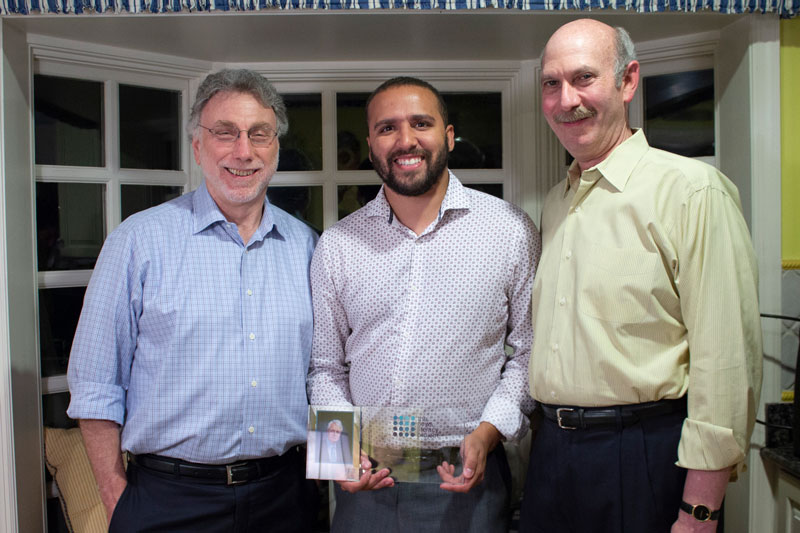
Washington Post executive editor Martin Baron (left) and NLP founder and CEO Alan C. Miller (right) with the Post’s Wesley Lowery, this year’s John S. Carroll Journalist Fellow Award honoree.
For his contributions to journalism in the public interest and to news literacy, Wesley Lowery of The Washington Post has earned the News Literacy Project’s John S. Carroll Journalist Fellow Award for 2018.
A national correspondent covering law enforcement and justice, Lowery led the Post’s “Fatal Force” project, which was awarded the Pulitzer Prize for National Reporting in 2016. The Post’s creation of a comprehensive database of fatal shootings by police and its related news articles led, among other changes, to the FBI’s vow to improve its tracking of such incidents.
Lowery’s first interaction with NLP came in 2015, when he was interviewed by founder and CEO Alan C. Miller about being arrested in Ferguson, Missouri, as he was reporting on the fatal shooting of Michael Brown, an unarmed black teenager, by a police officer. His eloquent description of his arrest became the basis for a thought-provoking lesson in Facing Ferguson: News Literacy in a Digital Age, an 11-part unit that NLP produced in collaboration with Facing History and Ourselves.
“I really became a believer in this organization,” Lowery said when he received the award at an NLP staff dinner on July 18. “The work you are doing is really important.”
Lowery’s other contributions to NLP include leading a discussion on race and policing at a NewsLitCamp® with the Post at the Newseum on April 21 and serving as the host of NLP’s revamped lesson on investigative reporting, “Democracy’s Watchdog,” for Checkology® 2.0, to be released in mid-August.
“Wes is a driven and deeply passionate journalist motivated by the highest ideals of the profession and a determination to enlighten the public on subjects that receive too little attention, particularly in the realm of race and justice,” Martin Baron, the Post’s executive editor, said when Lowery was presented with the award.
The John S. Carroll Journalist Fellow Award is given annually to an NLP journalist volunteer who has contributed significantly to NLP’s mission. Carroll, one of the most revered newspaper editors of his generation, led the Lexington (Kentucky) Herald-Leader, The Baltimore Sun and the Los Angeles Times. He also was one of NLP’s earliest supporters, served for four years as board chair and was a board member at the time of his death in 2015.
Honorees receive an engraved glass plaque with an etched photo of Carroll, along with a $500 check. NLP board members and staff select the recipients.
In presenting the award to Lowery, Miller said, “Wes reflects the values that John Carroll epitomized through his passionate commitment to a free and fearless press that holds the powerful accountable — and through his deeply reported, impactful, narrative investigative reporting.”
Controversial conversations about current events
An essential part of civic education is teaching students to be informed about — and to discuss — current events. It’s not enough for them to simply recite what’s happening; they need to be able to have a respectful, meaningful conversation with someone who may not share the same point of view. This concept is one of the “six proven practices” of civic learning as outlined in a 2017 report, The Republic is (Still) at Risk – and Civics is Part of the Solution, by Peter Levine and Kei Kawashima-Ginsberg of Tufts University.
The objective is not to engage in a debate, in the sense that one argument wins over another (though debates do have a lot of educational value). I’m talking about discourse: a conversation with an exchange of ideas and views about controversial topics — and one where those engaging in the conversation disagree without disparagement.
The priority for both sides is to share quality arguments, not to persuade. Discourse is a skill that improves with practice. Students often have opinions about many of the topics in the news, but they need the tools to focus their opinions in a respectful, productive manner.
Start with a discussion about how to have a discussion. Before you can have these controversial conversations, students often need to be shown how to do so in that respectful, productive way.
To start, everyone must agree to a set of ground rules. Consider using a protocol such as Circle of Viewpoints or the Socratic Seminar for these discussions. Some sample rules can include:
- Listen actively and attentively.
- Critique ideas, not the person who expressed them.
- Do not interrupt another speaker.
- Ask clarifying questions; don’t assume.
- Work toward a common understanding, not toward winning the argument.
Give students the opportunity to express their reservations about these discussions, and work them into establishing class norms. Make sure everyone understands and agrees to those norms.
The procedure for a whole class discussion is different than for small groups, so you will need to determine how large these conversations are going to be. In some cases, small groups may facilitate more engagement among students. The “pinwheel discussion” format can easily be adapted to current events. Another to consider is the “Conver-Stations” discussion strategy. Explore a variety of options to find one that fits with your students.
Spend time front-loading the discussion. Students will come to this with different viewpoints and opinions, but they all must have the same background information. Some resources for this include ProCon.org, Student Opinion from The New York Times and idebate from the International Debate Education Association. The day of your discussion, you might consider starting class with a gallery walk to refresh students’ minds about the topic. (The gallery walk can also be integrated into a great small group discussion format.)
(For now, I’m going to leave the topic of teacher viewpoint aside. There are a lot of different ideas about that; in the context of this post, I’m going to suggest that you focus on acting as the moderator. You’ll be in the best position to know if and when to express your viewpoints with your students.)
Discussing political issues and controversial current events is not something to approach lightly. Teachers must spend time and energy creating a classroom culture where ideas can be shared freely and students feel comfortable speaking about their experiences. Once you begin having these discussions, you’ll find your students actively seeking new information on a range of issues.
Resources
- “10 tips for talking about news, politics and current events in schools” (Dani Bostick, TED-Ed Blog)
- Teaching with the News (The Choices Program)
- “The Big List of Class Discussion Strategies” (Jennifer Gonzalez, Cult of Pedagogy)
- “From Provocative to Productive: Teaching Controversial Topics” (NewseumED)
- “A Civil Conversation” (Constitutional Rights Foundation Chicago)
- “Talking Across Divides: 10 Ways to Encourage Civil Classroom Conversation On Difficult Issues” (Katherine Schulten, The New York Times)
- “Difficult Dialogues” (Vanderbilt University Center for Teaching)
Follow me on Twitter (@MrSilva).
New York City students earn NLP’s Gwen Ifill Award
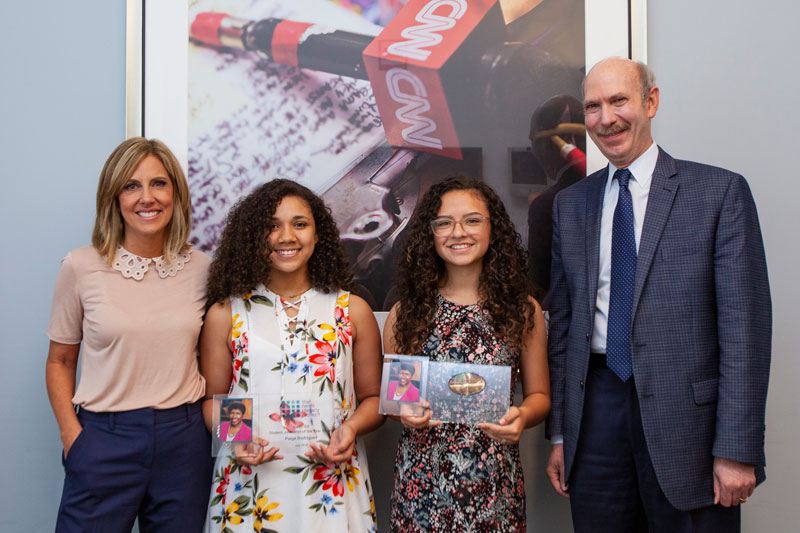
Paige Rodriguez (center left) and Sophia Fiallo (center right) are this year’s Gwen Ifill Student Journalist of the Year Award honorees. They were joined at the awards luncheon by CNN’s Alisyn Camerota (left) and NLP’s Alan C. Miller (right). Photo by Meredith Whitefield.
“Checkology® taught me to seek news rather than receiving it, so I went out and investigated it myself,” Sophia Fiallo told a July 12 awards ceremony at which she and Paige Rodriguez, classmates at The Young Women Leadership School of Astoria, were presented with the News Literacy Project’s Gwen Ifill Student Journalist of the Year Award.
Fiallo was referring to a photograph that appeared to show Emma Gonzalez, a student at Marjory Stoneman Douglas High School in Parkland, Florida, tearing up the Constitution. In fact, Gonzalez had been photographed ripping up a shooting target. When Fiallo saw that a friend had shared the doctored image online, she says her Checkology training kicked in: “It didn’t come from a reliable news source.”
Fiallo and Rodriguez were presented with their awards — an engraved glass plaque with an etched photo of Ifill, along with a $250 gift card — by Alan C. Miller, NLP’s founder and CEO, at a luncheon at CNN’s New York offices hosted by Alisyn Camerota, co-anchor of CNN’s New Day and a member of NLP’s national advisory council.
The rising 10th-graders, who with their classmates attended the April 16 Pulitzer Prize announcements at Columbia University, have made the news literacy skills they were taught in journalism class a part of their lives. Both share a passion for the lessons they learned from Checkology — and both clearly understand that those lessons also apply beyond the classroom.
Rodriguez said she routinely uses what Checkology has taught her — including, for example, when she saw some news online about an actress on the Netflix series On My Block. Because she hadn’t heard of the site where the news was posted, she used her experience with Checkology to take the piece through a series of credibility tests before sharing it with friends.
Using the platform, Rodriguez said, was “eye-opening”: “Checkology has changed the way that I trust my sources.” In fact, the lessons are now so ingrained that she doesn’t even need them in front of her to know what to ask. Everyone, she said, can benefit from Checkology — “even the older generations.”
Fiallo said that before her news literacy training, she was “vulnerable to the spread of fake news” — but “thanks to Checkology, I’ve learned how to tell fact from fiction.” And, she added, “I’m now interested in pursuing a career in journalism.”
This is the second year that NLP has recognized students with the award, which commemorates the trailblazing journalist — and longtime NLP supporter and board member — who died in 2016. It is presented to female students of color who represent the values Ifill brought to journalism as the first woman and first African-American to serve as moderator of Washington Week and as a member (with Judy Woodruff) of the first female co-anchor team of a network news broadcast on PBS NewsHour. Honorees are selected by a committee of NLP staff and board members.
From the newsroom to the classroom
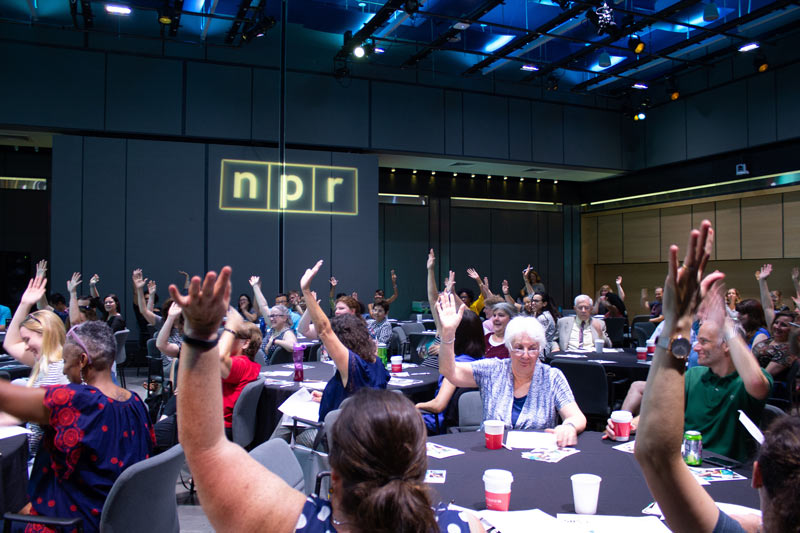
Montgomery County, Maryland, educators filled a meeting room at NPR headquarters at the start of NewsLitCamp.
More than 70 educators from Montgomery County (Maryland) Public Schools kicked off their summer with an NLP NewsLitCamp® at National Public Radio’s Washington, D.C. headquarters. A signature NLP professional development program, NewsLitCamps are held in conjunction with a news organization. With guidance from NLP staff, educators and journalists come together to examine the importance of news literacy and the standards of quality journalism.
“It was really useful to talk to professional journalists and editors to get their opinions/expertise on aspects of news judgment and bias! It helps me make my journalism classes more credible and more based in what journalists are actually doing and talking about,” wrote Megan Cooley-Klein, an English and journalism teacher at Quince Orchard High School in Gaithersburg, Maryland, who attended the NPR session.
NLP has held six NewsLitCamps since April 2017 — two in the Chicago area, two in Washington and one each in New York City and Miami. Each day-long program features an overview of today’s information landscape and news literacy strategies by an NLP staff member, along with breakout sessions led by journalists on topics such as news judgment, bias, beat coverage and the standards of photojournalism, and closes with teacher-selected workshops on topics that they identify during the day.
In addition to a NewsLitCamp next month in Arlington, Virginia, NLP already has sessions planned for Los Angeles, Houston, Chicago and Lexington, Kentucky, this year. For more information, contact Damaso Reyes, NLP’s director of partnerships
Using down-ballot races to encourage informed voting
Knowing whom or what you’re voting for (or against) is a lot more complicated than young people realize.
On the surface, voting is a remarkably simple act: Go to your polling place, get a ballot, put a mark by the name of the candidate of your choice and place the ballot in a box or a scanner. (In some states, it’s even easier: All registered voters can cast their ballot by mail.)
To be an informed voter, however, takes quite a bit of work. This is especially true when you take a look at all the offices and ballot issues that appear below the ones we’re all familiar with. In focusing on electing presidents, senators, governors and mayors, we often don’t pay attention to these down-ballot offices.
What does it mean to be an informed voter? The American Association of State Colleges and Universities’ American Democracy Project defines it as being “knowledgeable about the issues and positions of candidates when voting. It also means you are able to make decisions without influence from outside factors intended to persuade those who may not fully understand a candidate’s platform or ideas.”
I think it’s safe to say that many of us have cast uninformed votes.
Lesser-known offices
My ballot in the March 2018 Illinois primary — with 35 races and four ballot questions — was a daunting challenge in casting an informed vote. For instance, I found myself looking at a couple of job titles — Metropolitan Water Reclamation District Commissioner and Commissioner, Board of Review, 2nd District — and pondering what made the candidates for those positions qualified to hold them.
A number of judgeships and county-level offices also gave me pause (why were these positions on the ballot to begin with?). And while the ballot questions were simple enough to answer (the choice was “yes” or “no”), they added to the burden of trying to cast informed votes.
These down-ballot contests and questions offer students a unique opportunity to engage in purposeful deliberation about the impact of these offices on their communities. If “all politics is local,” as former U.S. Speaker of the House Thomas “Tip” O’Neill once famously quipped, it doesn’t get more local than some of these races.
Here’s an interesting starting point for discussion: Should all the offices currently on the ballot be elected positions? Examples of ones that are (or are not) elected, depending on the state, are judges, county coroners and sheriffs, as well as assorted commissioners and state party committeemen and committeewomen. To start this process, students (and many current voters) need to understand exactly what each position does and how that affects them and their communities.
Consider the Metropolitan Water Reclamation District (MWRD) in Cook County, Illinois, which includes Chicago and is the second most populous county in the United States. It’s responsible for ensuring the quality of the county’s water supply (which comes from Lake Michigan), protecting homes and businesses from flood damage and managing water as a vital resource. The MWRD is governed by an elected body of nine commissioners — the people who appear down-ballot and represent the residents of Cook County. Using these commissioners as an example, I thought of a series of questions for students to consider (which I also considered before casting my votes):
- Why are these commissioners elected?
- What are the qualifications I would want in someone who was responsible for making sure I have clean drinking water?
- Should I take a candidate’s political affiliation into consideration?
- Do these candidates’ viewpoints and positions on water issues differ? If so, how?
An interesting exercise for students is to have them search local news sources for stories about the positions. For my MWRD example, I would have students search Chicago-area news organizations for stories that mention the agency or some of the serving commissioners. Instead of relying solely on campaign materials, what can students learn from news coverage? Can these stories provide criteria for evaluating candidates?
Ethical questions
This also raises several broader questions about voting in general: Is it ethical to cast a vote for a candidate you know nothing about other than his or her name and political party? Is not voting at all worse than casting an uninformed vote? If a race has only one candidate, should you still cast a vote?
Talking about these down-ballot races in the classroom will open your students’ eyes to just how many elected officials there are at each level of government: federal, state, county and municipal. Your discussions can help focus your students on the lesser-known offices that have a profound effect on their communities. Inevitably (and hopefully), students will continue talking about this with their family members at home.
Most boards of elections provide sample ballots well in advance of election day. Some also publish detailed voter guides, as do some local good-government organizations and some news outlets. (Special interest groups may publish these as well to promote candidates whose views they agree with.) Providing these sample ballots or voter guides to your students can be an important first step in researching and discussion down-ballot races and questions.
I’ll close this post with another question for deliberation. When I go vote, I routinely refer to it as doing my “civic duty.” Voting is regularly described as a right, a responsibility and a duty. We rank voting as being very high in importance, but in the United States it is not compulsory. So is voting a duty that we are obligated to perform, or is it a right that we can exercise as we desire?
In my next post, I’ll share some ideas and resources for becoming a better-informed voter and explain different types of endorsements — for example, from newspaper editorial boards, from celebrities and from labor unions — all aiming to persuade you to vote a specific way.
Distinguishing among news, opinion and propaganda
When you watch news programs on CNN, Fox News or MSNBC, do you notice how often they switch between straight news reporting and commentary? Can you tell which person on screen is a journalist and which is a pundit? The ability to distinguish news from opinion is a foundational news literacy skill, and it’s an essential one for students engaged in a cause or advocacy. And if that isn’t enough, students must also learn to know the difference between opinion and propaganda.
What is news?
What we call “quality journalism” aspires to ethical standards. These are codified, with some variations, by professional journalism associations, journalism schools and individual news organizations. These standards include:
- Truthfulness/accuracy: Verifying all details that can be checked; using multiple original sources (individuals and documentation) wherever possible.
- Independence: Putting the interests of the public above self-interest or special interests.
- Balance: Giving a voice to multiple perspectives.
- Fairness/avoidance of bias: Presenting facts and details in appropriate context, using neutral language.
- Accountability: Acknowledging errors and correcting them promptly.
There are others, of course, and there is significant detail that can be added to these. The key to approaching the question “What is news?” with your students is this: A quality news article can be objectively identified using such standards. “Practicing Quality Journalism,”* a lesson in the Checkology® virtual classroom, introduces the standards of quality journalism in an engaging simulation.
Opinion vs. propaganda
Here’s where things can get a little tricky. The key is to determine the purpose of what you’re reading, watching or hearing.
“Opinion” (often described by news outlets as “commentary” or “editorials/op-eds”) presents a specific perspective on a topic or issue. While it may use emotional appeals to persuade readers, viewers or listeners to consider the position it’s arguing for (or against), the message includes verifiable facts and evidence. That evidence may be open to some interpretation, but it is still clear and supported by reasoning. In addition, other perspectives and positions may be presented for balance and contrast. The best opinion pieces use facts and coherent arguments to explain why we should agree with the position.
“Propaganda” has a wide variety of definitions. The most important elements of propaganda are that it speaks to our fears and insecurities, it distorts and manipulates facts and information, it often includes falsehoods and it’s one-sided. Propaganda most commonly uses logical fallacies in its efforts to persuade — especially attacks on opponents and strong emotional appeals.
Propaganda also uses misinformation and disinformation. While students often think of these as synonymous, there is an important distinction: Does the person who is sharing the information believe that it’s true, or does he or she know that it’s false but is sharing it anyway? The former is misinformation, the latter is disinformation. Propaganda uses both.
The ability to distinguish among news, opinion and propaganda becomes particularly important when students become engaged in a social or political cause. As they learn more about an issue, they will inevitably be confronted with all three categories. Recognizing the differences empowers students to seek out reliable, factual sources and to ignore misinformation and disinformation.
With this knowledge, students can move from passively consuming information to actively creating it. They can write about the world around them (or produce videos or podcasts) and try to persuade others to support their causes and issues. When students are reliably informed, they become empowered to express their own beliefs and add their voices to discussions of issues and policy.
Resources
- Logical Fallacies (Purdue Online Writing Lab)
- Argument, Persuasion, or Propaganda? (PDF download) (ReadWriteThink.org)
- What Is Propaganda? (Mind Over Media)
- “How to Write an Editorial” (The New York Times)
*This sentence was revised in August 2019. It originally referenced the Checkology lesson “Getting the Story” (Module 4, Lesson 1), which was replaced by “Practicing Quality Journalism” in an update of the platform for the 2018-19 school year.
Tucker Eskew joins News Literacy Project Board
Tucker Eskew, a strategy and marketing executive, has joined the board of the News Literacy Project.
“If we’re to have a healthy democracy, our society needs to build platforms for truth and context in a sea of information and misinformation,” he said. “I’m proud to join the News Literacy Project as you build those supports where they’re most effective and lasting, especially in our schools.”
A founding partner at Vianovo, a strategic advisory firm with offices in Washington, Dallas, Austin and Mexico City, Tucker began his career in politics working on President Ronald Reagan’s re-election campaign in 1984 and spent eight years as press secretary for South Carolina Gov. Carroll Campbell. He began working in technology marketing and web communications in the mid-1990s, co-founding an electronic commerce business and starting a South Carolina-based public relations and business consulting firm.
Tucker was a senior communications advisor on George W. Bush’s presidential campaign in 2000 and joined the Bush White House in 2001, serving as director of media affairs and director of global communications. After the Sept. 11 attacks, he went to London as President Bush’s wartime communications representative to No. 10 Downing Street. He held a leadership role in the 2004 Bush-Cheney campaign and in 2008 was counselor to the GOP vice presidential nominee.
“Tucker brings NLP a wealth of strategic communications experience and expertise just as we begin to expand our outreach and raise our profile,” said NLP board chair Greg McCaffery. “His experience on other nonprofit boards as well as his extensive range of contacts will also serve us well.”
Following your elected officials on social media
If you teach civics or social studies, encourage your students to identify their elected officials — local, state and national — and to use social media to follow what those officials are doing. This connectedness presents several unique educational opportunities.
Check out ProPublica’s Represent, where users can easily find the names of their senators and House members and get in-depth information about a wide range of political and social issues. Or look at Common Cause, a national watchdog organization that also has local offices in 35 of the 50 states. Another way to stay informed is to set up news alerts on Google News and other news aggregators.
Ask your students to track the social or political issues that are most important to them. Which issues get more attention from elected officials? Are the officials asking for — and responding to — their constituents’ thoughts and opinions, or are their accounts more “one-way”? Do they share verified information? Do they ever share inaccurate information — and if they do, do they acknowledge it if it’s pointed out?
Or consider this: If the official disagrees with a post or tweet, does he or she delete the post or block the person? In June 2017, ProPublica described how elected officials and government agencies — from President Donald Trump to city police departments in Seattle and Honolulu — were blocking their critics on Twitter. A month later a group of Twitter users sued Trump for blocking them. ProPublica also filed a public records request with 22 federal agencies and all 50 state governors, seeking the names of people they had blocked on social media; the result, published in December 2017, was a list of about 1,300 people. This raises the question: Does deleting comments or blocking users violate the First Amendment’s protection of free speech?
Finally, have any of your elected officials tweeted something and then deleted it? Politwoops (run by ProPublica) tracks the “Tweets They Didn’t Want You to See” — both by people currently in office and by candidates for office. Use the site’s search function to find your officials and see whether they deleted any tweets; if they did, try to determine the importance of the deleted message.
Identifying your elected officials and following them on social media are the first steps to becoming informed about who represents you. The next step is learning how to engage with these officials in a responsible way.
Cultivating the connection between news literacy and civic engagement
Information is a fundamental element of democracy. It is the basis for our understanding of the world around us: how we analyze social issues, assess challenges, determine political priorities, form opinions and evaluate our options.
It is, in short, the raw material we use to make decisions and take action.
Civic engagement in the 21st century requires us to be knowledgeable — and critical — consumers of news and other information in what is, by many magnitudes, the largest and most complex information landscape in human history. The skills needed to become a “knowledgeable — and critical — consumer” are also the foundational skills for civic engagement in the digital age.
In future posts, I’ll be sharing ideas and resources to cultivate the connections between news literacy and civic engagement. As noted in a 2016 Pew Research Center study, civic engagement is closely tied to local news habits. People who read, watch and value local news tend to vote regularly in local elections and have stronger connections to their communities — two key measures of the civic engagement that we want to encourage in students.
According to The 2006 Civic and Political Health of the Nation — a report by Tufts University’s Center for Information and Research on Civic Learning and Engagement (CIRCLE) — civic engagement can be defined by three types of activities:
| Civic | Electoral | Political Voice |
|---|---|---|
| Community problem-solving | Voting regularly | Contacting officials |
| Regular volunteering for a nonelectoral organization | Displaying buttons, signs, stickers | Contacting the media |
| Actively participating in a group or an association | Volunteering for candidates or political organizations | Protesting |
| Taking part in a fundraising run/walk/ride | Contributing to campaigns | Boycotting |
| Other fundraising for charity | “Buycotting” | |
| Signing/circulating petitions |
News literacy is an essential skill for all these actions. If you don’t understand what is happening in your community or in local, state and national politics, you’re less likely to perform even the simplest of civic acts.
News-literate students are able to identify different forms of information — such as news, opinion, propaganda, advertising and entertainment. They can explain the importance of a free press in civil society and the watchdog role the press frequently plays. They consume news from diverse sources and seek out information from outlets that adhere to the standards of quality journalism. They can recognize the nuance involved in ongoing debates about the practice of journalism, and can form strong, evidence-based opinions about the quality of the news that they encounter. They can take advantage of a variety of tools to identify and flag false or misleading information.
In short, they have learned how to know what to believe.
NLP’s response to statement by UNAOC on World Press Freedom Day event
The United Nations Alliance of Civilizations (UNAOC) issued a statement earlier this evening, and here is our response. See our previous post for further background.
In contrast to the UNAOC statement, here is what happened:
- The event was planned for four months without any suggestion of a conflict. In multiple conversations on Tuesday, in which he asked us to edit or withhold our videos, Jordi Torrent, the project manager for media and information literacy at UNAOC, never mentioned a conflict with another event, a decline in registrations for the event or any panelists withdrawing. On April 30, he told me that 160 people had registered for the event, over the capacity for the room and exceeding his goal of 150 registrations.
- NLP submitted the videos (total length of 4½ minutes) in advance on Monday, as requested. At no time were we told that they needed prior approval or might be censored. We would not have agreed to such terms.
- In two conversations on Tuesday, Torrent said that UNAOC might need to cancel the event if NLP did not agree to edit a video initially to remove the reference to Turkey and, subsequently, to not show any videos. Only on Wednesday morning, after NLP refused to accept these conditions, did he say that, following a long discussion with his supervisors, UNAOC had decided to postpone the event. “The official reason,” he said, “is because we are competing with an event on press freedom that the Secretary General is organizing at the same hour.” I told him that we would need to state the real reason for this action, and he said he understood and apologized.
- In our initial conversation on Tuesday, Torrent told me that UNAOC had already edited the introductory video — without NLP’s permission — to remove the reference to one country. He asked me to agree to this “as a favor” and said he was “embarrassed” to do so.
- Simultaneously, UNAOC sent NLP the edited video with an eight-second reference to journalists arrested in Turkey seamlessly deleted but leaving mention of cases of restrictions on press freedoms in Mexico and Russia. Torrent asked me to view this during this conversation and said that this video — and two others featuring journalists from Russia and Pakistan discussing restrictions on press freedom in their countries — would be acceptable to show if we agreed to this single edit.
- In a subsequent conversation, he explained Turkey’s role as one of two countries (along with Spain) that had proposed the creation of UNAOC in 2005. He said the situation reflected “a deeper political issue that we need to see how to handle.” If the video was shown unedited, he said, “I know it will cause problems for us … I am enraged about it and I don’t feel good about it. I am stuck with it for now.”
- After conferring with his supervisors, Torrent asked NLP to refrain from showing any videos. “We are not the agency in the U.N. to discuss these issues,” he said. “To single out countries puts us outside of our mandate.” If NLP was willing to proceed with the panel, he said, “the conversation could still be open.” He also said, “It will be great if we find a solution.”
- When I told Torrent that we would not delete the reference to Turkey, he ended the conversation this way: “I fully understand and I support you.” He said he would inform his supervisors and let them make the decision. “Whatever will be, will be,” he said. “I can tell them I tried.”
- Torrent never expressed a concern about the accuracy or quality of the opening video. “It’s a beautiful video,” he said. “It’s a great video. It’s very nicely done.”
- No members of the panel I was moderating canceled before the event. They included Brian Stelter, CNN’s senior media correspondent and host of Reliable Sources, a weekly show on media issues; Farnaz Fassihi, senior writer at The Wall Street Journal; Patrick Butler, vice president of programs at the International Center for Journalists; Maria Salazar-Ferro, emergencies director at the Committee to Protect Journalists; and Juliane von Reppert-Bismarck, director of Lie Detectors, a European educational program. Nor was I told that any members of the second panel, to be moderated by Torrent, were unable to attend.
- We have no intention of participating in a future event on world press freedoms with UNAOC.
NLP declines to accept terms for participation in U.N. agency event for World Press Freedom Day
Update May 3, 12:00 p.m.: The presentation we had planned to make at the UNAOC event is now at the end of this blog post.
Update May 3, 9:45 a.m: The second paragraph was revised to clarify that the remarks on restrictions in press freedom in certain countries were written by NLP and are not the opinion of the lesson host.
The United Nations Alliance of Civilizations (UNAOC) indefinitely postponed an event at the U.N. tomorrow to observe World Press Freedom Day after the News Literacy Project (NLP) refused UNAOC’s request to remove references in our presentation to several countries where press freedom is limited.
The references are in videos from a new lesson on international press freedoms in our Checkology® virtual classroom, which I was planning to introduce at the event. The videos include remarks, written for the lesson by NLP and presented by lesson host Soraya Sarhaddi Nelson of NPR, about severe restrictions on press freedom in Turkey, Mexico and Egypt and comments by Russian and Pakistani journalists describing the challenges they face.
NLP submitted the presentation to UNAOC on Monday so it would be ready to be shared with the audience. A UNAOC official then asked us to delete the reference to Turkey — which, along with Spain, had proposed the creation of UNAOC in 2005 — and the official later insisted that NLP not share any of the video clips.
I could not permit this censorship of our presentation due to the stated concern that it would offend one or more countries engaged in repression and violence against journalists. We at NLP find UNAOC’s decision particularly ironic because the event was to celebrate World Press Freedom Day. We had not discussed prior review of our presentation with UNAOC and would not have agreed to participate if it had been asked.
I was to serve as moderator of a panel focusing on “the role of press freedom internationally” and highlighting “NLP’s new lesson on world press freedoms,” according to UNAOC’s announcement of the event. Participants were to include Brian Stelter, host of CNN’s Reliable Sources; Farnaz Fassihi, senior writer at The Wall Street Journal; and staffers from the International Center for Journalists, the Committee to Protect Journalists and Lie Detectors, an educational program.
In an email today, UNAOC told the panelists and more than 150 registered attendees that the long-planned event was being postponed “until future notice” because of another event at the U.N. scheduled at the same time.
NLP students shine at Pulitzer Prize announcement event
NLP’s partnership with the Pulitzer Prizes continued to grow in impressive fashion yesterday as NLP students asked most of the questions at a news conference that followed the announcement of this year's Pulitzer Prize winners.
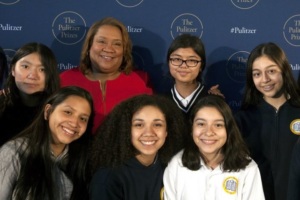
Students at The Young Women’s Leadership School of Astoria — all of whom have used NLP’s Checkology virtual classroom — attended the announcement of the Pulitzer Prizes at Columbia University on April 16. Afterward, they met with Dana Canedy (back row, in red), the Pulitzer Prizes’ administrator.
More than a dozen NLP students from several New York City public schools attended the event at Columbia University. Four students who have completed lessons in NLP’s Checkology® virtual classroom were among those who asked questions of Pulitzer Prize Administrator Dana Canedy.
Tenzin Choezin, a ninth-grader at The Young Women’s Leadership School of Astoria, was the first questioner: “What advice do you have for aspiring female journalists?”
“I hope you are an aspiring young journalist, because that was a great question and we can use people like you,” said Canedy, who spent more than two decades as a reporter and editor at The New York Times and was the lead journalist for a Times series that won the Pulitzer Prize for National Reporting in 2001. “Whether it’s journalism or any other profession, find something that you’re impassioned about and stick to it. Don’t ever let anyone tell you that you can’t do it.”
The students’ invitation to attend the Pulitzer Prizes announcement was part of a deepening partnership that began last week when Canedy participated in a Virtual Visit with Premium subscribers to NLP’s Checkology virtual classroom. Eugene Robinson, a Pulitzer Prize-winning columnist at The Washington Post and the chair of the Pulitzer board, and Alan C. Miller, the founder and CEO of NLP and a Pulitzer winner with the Los Angeles Times, held a second Virtual Visit yesterday before this year’s winners were announced.
A third Virtual Visit is planned for May 30, when the prizes will be awarded during a luncheon at Columbia’s Low Library. As part of the partnership, NLP will also receive access to the Pulitzer Prizes’ digital archive when it is complete and plans to use it to supplement lessons in the virtual classroom.
Sonam Lhamo, another ninth-grader at The Young Women’s Leadership School, asked the final question yesterday: “How does it feel to be the first woman and person of color to serve as the administrator of the Pulitzer Prizes?”
“I am so humbled and blessed and honored,” Canedy responded, adding: “Seeing you young ladies and some of the students here — if in years ahead you guys think, ‘You know what? I can do that too,’ then I’m proud of being a part of having you here today.”
News Literacy Project partners with the Pulitzer Prizes
Our partnership with the Pulitzer Prizes got off to a fine start on April 9 when Dana Canedy, the first woman and first person of color to serve as the prizes’ administrator, joined NLP’s Damaso Reyes for a Virtual Visit with Premium subscribers to our checkology® virtual classroom.
Another Virtual Visit is scheduled for Monday, April 16 (the day of the announcement of the 2018 prizes), with two Pulitzer Prize winners: Washington Post columnist Eugene Robinson, chair of the Pulitzer Prize board and the winner of the 2009 prize for commentary, and NLP founder and CEO Alan Miller, who won the 2003 national reporting prize as an investigative reporter with the Los Angeles Times. That same day, a group of NLP students will attend the announcement in person and have the opportunity to ask questions at the post-announcement press conference.
Finally, a Virtual Visit in May will feature several of this year’s prize winners, who will be in New York City for the annual Pulitzer luncheon at Columbia University.
“The work NLP is doing to help young people understand the value of news and high-quality information mirrors the Pulitzer Prizes’ dedication to highlighting the best of American journalism,” said Canedy, who spent more than two decades as a reporter and editor at The New York Times and was a lead journalist on the series “How Race Is Lived in America,” which won the Pulitzer Prize for national reporting in 2001.
In addition, NLP is gaining access to the newly digitized Pulitzer Prize archives and will feature this prize-winning journalism as supplemental lessons in the checkology® virtual classroom. The two organizations will also work closely over the next year to offer in-person opportunities to students in the New York City area, as well as virtual opportunities to NLP’s global network of educators and students using the checkology® virtual classroom.
“NLP is excited to be working so closely with the Pulitzer Prizes and to give access to their archive — and to these unique opportunities — to the students who participate in our program,” Miller said.
Peter Kadzik joins NLP board
Peter Kadzik, a partner in the Washington office of Venable LLP, is the newest member of the News Literacy Project board.
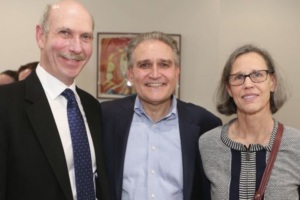
Kadzik (center) is joined by NLP’s Alan Miller and fellow board member Leslie Hill (right) at a reception for NLP supporters in February.
Kadzik’s association with NLP began with its creation in 2008, when he worked on its application for tax-exempt status as a nonprofit organization. He also was the founding chair of NLP’s D.C. advisory committee before resigning in 2013 to join the U.S. Department of Justice as principal deputy assistant attorney general for legislative affairs. From June 2014 to January 2017 he served as assistant attorney general in charge of the Office of Legislative Affairs, where he managed the department’s relationships with Congress and advocated for its interests on Capitol Hill, including the confirmations of Loretta Lynch as U.S. attorney general, Sally Yates as deputy attorney general and James Comey as director of the FBI. Upon leaving government service, he rejoined the D.C. advisory committee.
“Now more than ever, it’s critical for students to understand how to evaluate the credibility of what they read online and in traditional media outlets — and question whether it is legitimate,” Kadzik said. “NLP provides students with the necessary tools to make these judgments. I was pleased to assist in the formation of NLP 10 years ago, and now I am proud to serve on its board and further its mission.”
Kadzik is a partner in Venable’s government division, focusing on the firm’s congressional investigations practice and working closely with the investigations and white collar defense, litigation and regulatory practices. Before joining the Justice Department, he spent more than 30 years as a partner at Dickstein Shapiro LLP, where, among other things, he advised nonprofit organizations and trade associations on a variety of legal and policy matters.
“Peter brings tremendous legal experience and knowledge to the board, as well as a broad network of contacts and a deep commitment to our mission,” said Gregory C. McCaffery, the CEO and president of Bloomberg BNA and the chair of the NLP board. “We very much appreciate all that he has already done for NLP and look forward to working closely with him in the future.”
Flipboard donates company stock to NLP
Many of you know Flipboard as “the place to find the stories for your day, bringing together your favorite news sources with social content, to give a deep view into everything from political issues to technology trends to travel inspiration.”

/ Shutterstock.com
At the News Literacy Project, we know Flipboard as a strong supporter of our mission to make news literacy an integral part of the American educational experience.
So we’re extremely proud — and humbled — to announce that Flipboard, a privately held company, has donated 0.1 percent of its stock to the News Literacy Project.
“We appreciate this extremely generous gift, which will help us expand our reach and impact in the future,” said Alan C. Miller, NLP’s founder and CEO. “The donation is particularly meaningful given what Mike and Marci McCue have accomplished with Flipboard, including its commitment to sharing quality journalism and its use of humans to curate stories.”
This is the first time Flipboard has donated stock to a nonprofit, said Marci McCue, the company’s chief marketing officer. It did so, she added, because it’s important to understand not just the news, but the radical changes in the way news is now delivered.
“Having an organization like NLP help teachers stay on top of the shifting landscape in a neutral, factual way is a huge service to educators and students,” said Marci, who is also a founding member of our national advisory council.
Thank you, Flipboard!
NLP establishes national advisory council
Alisyn Camerota of CNN, Pierre Thomas of ABC News and Marci McCue, an executive at Flipboard, are joining the News Literacy Project as the inaugural members of NLP’s national advisory council.
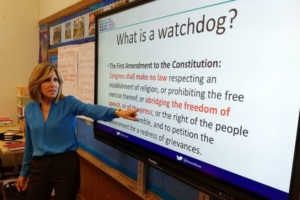
Alisyn Camerota, the co-host of CNN’s “New Day,” visits the Young Women’s Leadership School of Astoria in Queens, N.Y., to deliver a news literacy lesson for NLP. Photo by Damaso Reyes
The council will offer guidance on outreach and advocacy to NLP staff and board members and will support NLP financially and through introductions and appearances at events. Members will serve an initial term of four years.
Camerota is the co-host of CNN’s morning program, New Day. She joined CNN in 2014 after 16 years at Fox News Channel, where she was co-host of America’s News Headquarters, a co-anchor of Fox & Friends Weekend and a contributor to the Fox & Friends weekday franchise. As an NLP volunteer journalist fellow, she spoke to students at The Young Women’s Leadership School of Astoria in Queens, New York, in December 2017 and wrote about her experience for CNN.com.
“At a time when Americans are increasingly confused about which news outlets to trust, I am proud to be part of the News Literacy Project’s effort to empower students to differentiate between fact and fiction,” she said about her role on the national advisory council. “Not all news is created equal. The News Literacy Project is here to remind students of the vital role journalism, free speech and the First Amendment play in their lives.”
Thomas is the senior Justice Department correspondent at ABC News, where his work covering law enforcement, terrorism and homeland security has received some of broadcast journalism’s highest honors, including Emmy, Peabody and Alfred I. duPont–Columbia awards. Before joining ABC in 2000, he was a Justice Department correspondent for CNN and a reporter at The Washington Post. He was one of NLP’s earliest volunteer journalist fellows, participating in NLP’s classroom lessons in Washington, D.C., area schools and serving on NLP’s D.C. advisory committee.
More recently, Thomas interviewed student users of the Checkology® virtual classroom at an NLP reception in October 2017. A month later, he spoke about covering race and justice in America on behalf of NLP at the annual conference of the National Council for the Social Studies in San Francisco. “An informed citizenship is integral to democracy,” he told the educators, adding that NLP helps students to “master core skills about news literacy so they can make decisions about what to share, believe and act on.”
McCue is the chief marketing officer at Flipboard, a news and social media aggregator, where she supervises the development of all outbound communications, editorial curation, social media, public relations, product messaging and partner marketing, and consumer support. Before joining Flipboard, which her husband, Mike McCue, co-founded, in 2010, she held communications positions at Tellme Networks, Excite@Home and Adaptec.
“The News Literacy Project teaches fundamental civic values that need to be more deeply integrated into our educational curriculum,” she said. “I believe deeply in this mission and, as part of the NLP team, hope to encourage others to engage in the work ahead — ensuring that young people across the country understand what real news is and how essential it is to the life we enjoy in our democracy.” She and her husband recently supported NLP with a personal gift of $50,000.
Alan C. Miller, NLP’s founder and CEO, said he was looking forward to working with the council as NLP expands its programs across the United States and around the world. “The national advisory council will help us elevate our profile and command new resources at this crucial moment,” he said. “We’re honored to have Alisyn, Marci and Pierre as our initial members.”
NLP celebrates its 10th anniversary
Today is the 10th anniversary of the official launch of the News Literacy Project. We’ve come a long way in our first decade. Even more striking is how much the world around us has changed.
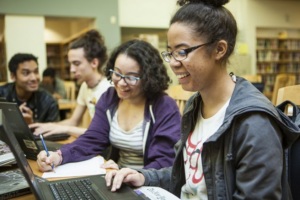
In April 2016, prior to the platform’s formal release, seniors in a journalism class at Frank Sinatra School of the Arts in New York City were among the first to try NLP’s Checkology® virtual classroom.
I had left my 21-year career at the Los Angeles Times with the idea of connecting journalists and educators to teach middle school and high school students how to know what to believe in the digital age. Little did I know that I would become recognized as a founder of the field of news literacy — long before the advent of concerns about “fake news,” “alternative facts” and Russian disinformation.
I devoted considerable energy in those early years to explaining to anyone who would listen what news literacy was, to selling funders of journalism and education programs on why news literacy mattered, and to convincing often-stretched teachers that news literacy deserved a coveted place in their classrooms.
The landscape changed dramatically during and after the 2016 presidential campaign, when it became evident that pervasive misinformation — combined with the growing challenge of sorting fact from fiction — was a threat to the health of our nation’s democracy and to the safety of its citizens.
As one NLP board member asked me around that time: “So, how does it feel to be an overnight sensation after nine years of hard work?”
Clearly, the newfound limelight is helpful to our mission — but we have no time to bask in it. Given the formidable task at hand, we at NLP strongly feel “the fierce urgency of now.”
Fortunately, our early progress positioned us well to respond to the suddenly heightened demand for our services.
We used our in-person classroom and after-school programs as a sturdy foundation upon which to build our innovative Checkology® virtual classroom. Since the platform’s launch in May 2016, more than 11,000 educators in all 50 states, the District of Columbia and three U.S. territories and 83 other countries have registered to use it — making NLP the leading provider of news literacy education in the United States.
We’re now enlisting marketing partners to help us greatly extend its reach. We’re working on Checkology® 2.0, an expanded and even more engaging version of the platform that will include an international press freedoms lesson and our first Spanish-language lesson. We also have plans for a mobile app — a creative game that complements the virtual classroom.
We’re making an impact on other fronts as well. Our weekly newsletter, The Sift, turns the latest viral rumors, hoaxes, conspiracy theories and ethical issues into teachable moments for nearly 9,000 educators. Our NewsLitCamps bring scores of teachers into a newsroom for a day of stimulating professional development with our staff and the news organization’s journalists. Our new website, coming this spring, will offer tools and resources for the general public as well as for educators.
This progress has been made possible by our many partners: dynamic teachers and school administrators nationwide; 33 participating news organizations and more than 400 volunteer journalist fellows who have delivered more than 750 lessons in person and virtually; our distinguished and devoted board and advisory committees; and, of course, the foundation, corporate and individual donors who have supported us so generously.
As we embark on our second decade, we have much work to do. With more than 26 million students in U.S. middle schools and high schools, we have a long way to go to achieve our aspiration of seeing news literacy embedded in the American educational experience.
We’re extremely grateful to everyone who has already joined us on this journey, and we offer a heartfelt welcome to future participants, partners and patrons. Our cause is worthy and our challenge great. Together, we look forward to the road ahead.
Jeff Bezos supports NLP with $250,000 gift
We are thrilled to announce that Jeff Bezos, the CEO of Amazon and owner of The Washington Post, has donated $250,000 to the News Literacy Project.
As news literacy has gained such an important seat at the table of civic discourse, we at NLP have seen a massive amount of new interest in our programs. Jeff’s generous gift underscores this in a major way and will help us expand the fight for facts.
His support comes at a moment of enormous need for our programs, and it gives us a great opportunity to reach far more teachers and students with our Checkology® virtual classroom, which provides students the tools to become news-literate.
As a former reporter, I’ve greatly admired Jeff’s commitment to journalism and his stewardship of the Post. All of this makes his backing particularly meaningful. We welcome Jeff to our family of supporters with great gratitude.
Study: News literacy is key to fighting conspiracy theories
People who are knowledgeable about the news media are less likely to believe conspiracy theories.
 That’s even when those theories appear to confirm an individual’s political belief, a new study shows.
That’s even when those theories appear to confirm an individual’s political belief, a new study shows.
“The greater one’s knowledge about the news media — from the kinds of news covered, to the commercial context in which news is produced, to the effects on public opinion news can have — the less likely one will fall prey to conspiracy theories,” the authors, all professors of journalism or communication at U.S. universities, write in the December 2017 issue of the academic journal Communication and the Public.
The findings are important because they indicate that action can be taken to prevent the spread of conspiracy theories. News literacy, for example, can be taught in schools.
But, then, we’ve known for several years that effective news literacy lessons can make a difference.
How do students learn to tell fact from falsehood?
One way is our Checkology® virtual classroom.
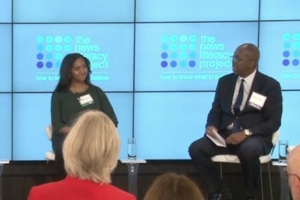 In this video, three students — Conor McCormick, Uriel Reyes Morales and Sihin Yibrah — tell Pierre Thomas of ABC News how our lessons opened their eyes to the world of false news and misinformation online. The students — all seniors at Wakefield High School in Arlington, Virginia — spoke candidly about their news and information habits during a News Literacy Project reception in Washington in October.
In this video, three students — Conor McCormick, Uriel Reyes Morales and Sihin Yibrah — tell Pierre Thomas of ABC News how our lessons opened their eyes to the world of false news and misinformation online. The students — all seniors at Wakefield High School in Arlington, Virginia — spoke candidly about their news and information habits during a News Literacy Project reception in Washington in October.
Yibrah relied on retweets and shares from her friends to let her know about the news — but she didn’t dig any deeper. Reyes simply believed much of what he saw on his phone, and might check with friends only if something looked dodgy. McCormick was more cynical: “I wouldn’t really believe much of anything I saw,” he said.
After they had completed the lessons in the Checkology® virtual classroom, though, their attitudes changed.
Yibrah, for example, described her current news habits, which include CNN, The New York Times and The Washington Post. And if she sees a questionable post on her social media feeds, she added, “I am quick to fact-check it.”
Take this viral: Fighting for trust, truth and a strong democracy
Of the many ideas that have gone viral on social media, Giving Tuesday is a standout as a positive force for good.
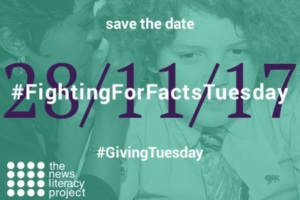 In the six years since New York City’s 92nd Street Y and the United Nations Foundation joined forces with a vision of a day focused on charitable contributions and social awareness, Giving Tuesday has enabled individuals to demonstrate their commitment — through donations of money and time — to nonprofits that provide solutions to our collective societal challenges.
In the six years since New York City’s 92nd Street Y and the United Nations Foundation joined forces with a vision of a day focused on charitable contributions and social awareness, Giving Tuesday has enabled individuals to demonstrate their commitment — through donations of money and time — to nonprofits that provide solutions to our collective societal challenges.
On this day, people are taking a break from internet shopping and surfing to join a worldwide philanthropic movement — one that supports organizations and causes that reflect their values and address their concerns.
Thanks to our supporters, we at the News Literacy Project are able to help students in middle school and high school use the power of social media to positive ends by providing them with tools, tips and resources to separate fact from falsehoods in everything they read, watch and hear. Through our innovative Checkology® virtual classroom, available anywhere there is an internet connection, they learn to apply the standards of quality journalism to discern credible, verifiable information from rumors, spin, propaganda and outrightlies.
Our goal is to provide students (and, increasingly, adults) with the skills to be smart, active consumers of news and information today and empowered, engaged participants in our nation’s civic life in the future.
While teens may be technologically savvy, many lack the critical-thinking skills needed to navigate today’s challenging information and news ecosystem. The potential for misinformation has never been greater, and the concept of news literacy is not widely taught in the nation’s classrooms.
More than 9,500 educators in every state in the U.S. and in 77 other counties have registered to use the virtual classroom since its launch in May 2016. We’re a lean organization, and our resources have been primarily directed to program development, so much of our success to date has come from our programs going viral.
And it’s worked! Teachers and students praise the Checkology® platform for its innovation, engagement and results. Students have told us repeatedly how it has changed the way they think about what they read and share on social media — and how it has increased their interest in local, national and world news.
You can help us as we race to meet the demand and continue to develop new material and programs. Take a moment on this day, Giving Tuesday, and join our effort by making a tax-deductible contribution to the News Literacy Project. Post and share your support and affirm your values as we work together to give facts a fighting chance.